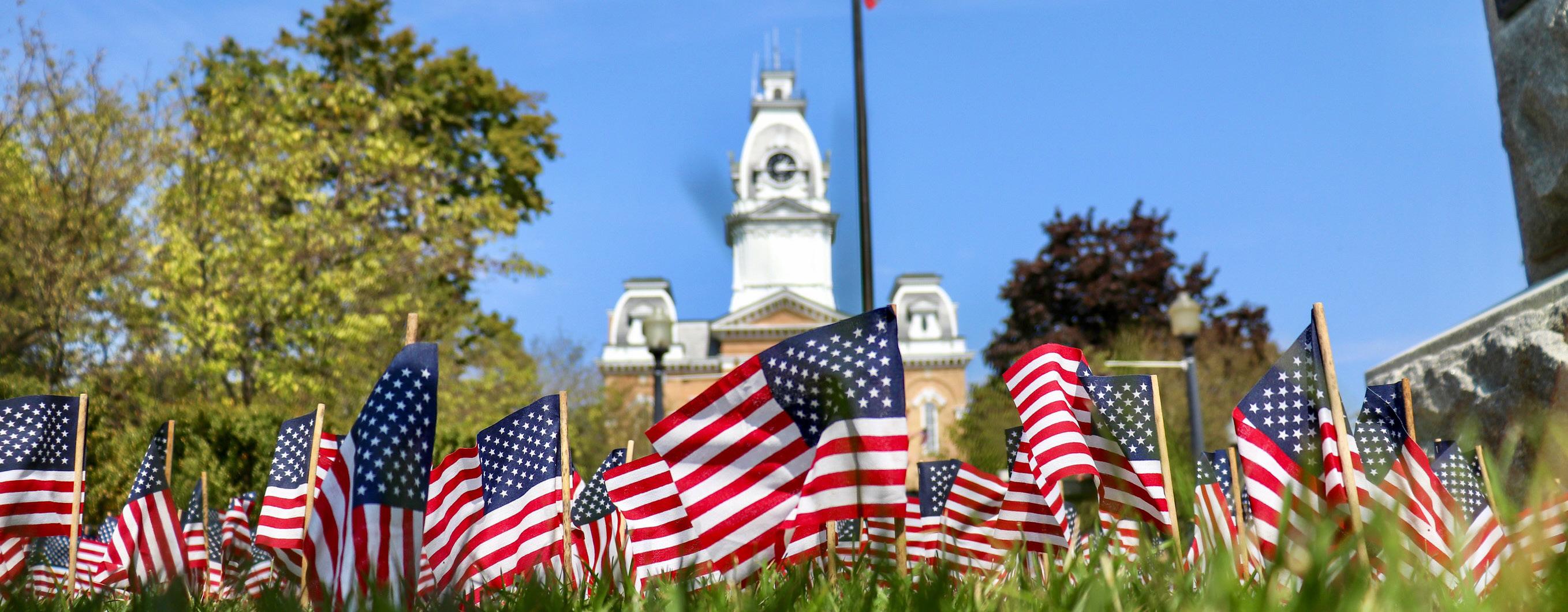

Arnn reflects on 25 years as college president
By Ty Ruddy Culture Editor
When students returned to campus in the fall of 2000, they might have discovered a new member of the administration wandering the quad and asking for directions.
It was Larry Arnn, whom the college had just hired as president from the Claremont Institute in California. He told The Collegian when he first began that Hillsdale College would aim to “save the nation.” Today, 25 years later, the college is on its way to doing just that. Still, Arnn said, change starts small.
campus, without anybody telling me how to get places,” Arnn said in an email to The Collegian. “Although lately there has been a setback in that regard because the routes keep changing because of construction.”
the college. Arnn often says “college means partnership.”
Students don’t come to Hillsdale, Michigan, he said, unless they are serious about what they are doing.
“Begin with the fact that I can pretty well navigate the
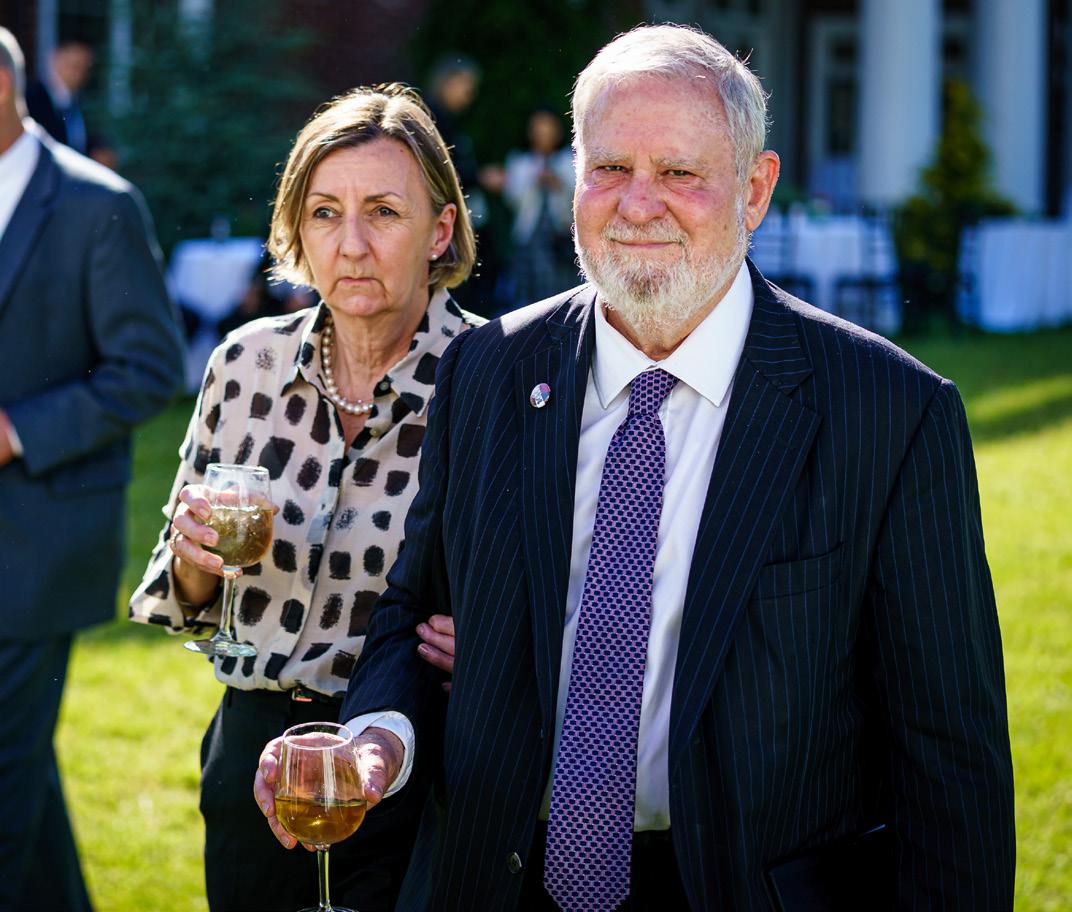
Campus remembers Charlie Kirk
By Moira Gleason Executive Editor
Hundreds of students, faculty, and staff mourned Charlie Kirk at a prayer vigil in Christ Chapel Wednesday night. Almost every pew was full as attendees recited psalms, sang hymns, and joined together to pray the Our Father for Kirk’s family and in gratitude for his work.
The conservative political activist and author died Wednesday afternoon after he was shot at an event at Utah Valley University near Salt Lake City. A long-time friend of College President Larry Arnn and Hillsdale College, Kirk visited campus on multiple occasions and publicly praised the college and its work.
“I am shocked and saddened by the murder of Charlie Kirk,” Arnn said in a statement. “He was my friend. I met him when he was 19 — a sharp young man, full of questions. I watched him grow into a good man and a great American. We pray for his family. Charlie’s virtues were many, and his work for this country will endure.”
The founder and CEO of the conservative youth organization Turning Point USA, Kirk was speaking at the campus event when he was shot in the neck. He died at the hospital shortly following the attack. The 31-year-old leaves behind a wife and two young children.
Arnn moved to rural Michigan with his wife, Penny, and their four children from California in 2000. The weather could be better, he said, but the Midwest is lovely in general.
“We like living in a small town. Penny and I grew up that way,” Arnn said. “The kids did fine in the transition and three of them live here now. Our grandchildren are here. It is easy to get around. Our neighbors are good people. I charge my Cybertruck in the garage and it otherwise requires no attention. My wife is what everyone knows: the best.”
As much as Hillsdale has been a blessing to the Arnns, the town is also a blessing to
Education secretary: Hillsdale is a ‘guide’
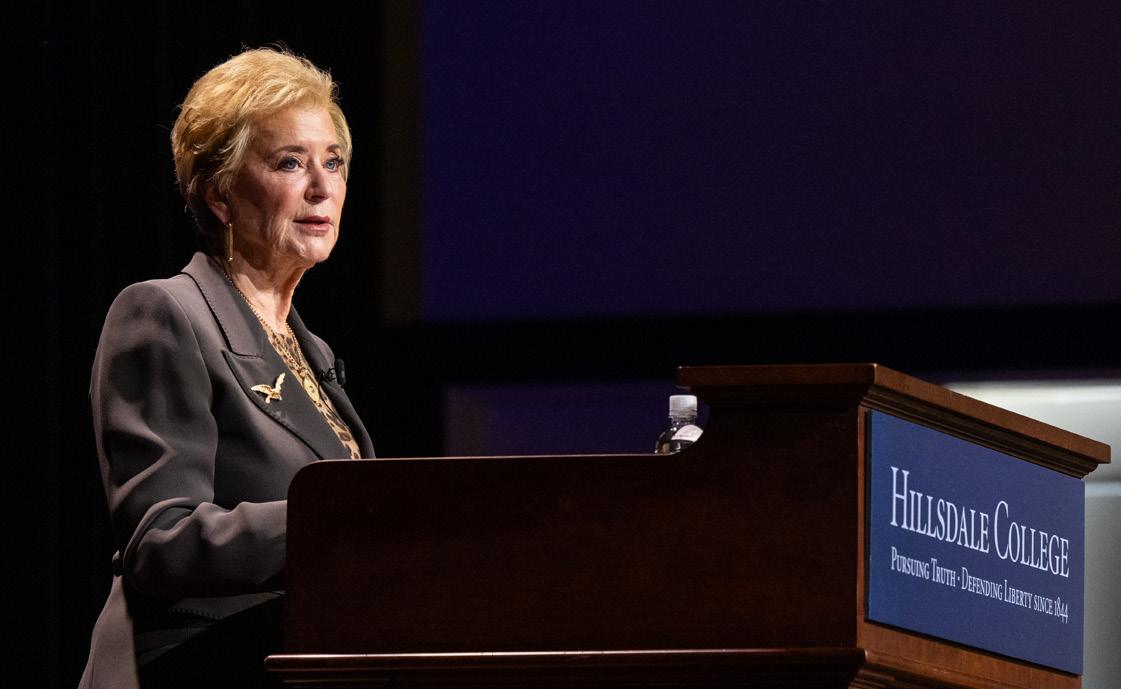
By Ellie Fromm News Editor
Secretary of Education Linda McMahon said Hillsdale College is a model for recovering higher education during a speech in Plaster Auditorium Monday.
“Let’s make them more like Hillsdale,” McMahon said.
“We all love Hillsdale, but one school shouldn’t have a monopoly on excellence. First, university leaders must prioritize their students’ growth, even when it makes them uncomfortable.”
She was sworn in as Sec-
retary of Education in March and has since decreased the size of the department by roughly half. Previously, she was CEO of World Wrestling Entertainment, on the Connecticut State Board of Education, on the Board of Trustees at Sacred Heart University, and was Administrator of the U.S. Small Business Administration during President Trump’s first term. She spoke at Hillsdale College following classroom visits at Hillsdale Academy.

“It is a great advantage for the college to be located here,” Arnn said. “It is cold and rural, so people do not come here for the wrong reason. That means the partnership works.”
And it has. Arnn said that, thanks to a team of great friends at the college, academic standards are higher now than they were when he first arrived, the core curriculum is larger, and the faculty is still dedicated to the mission of the college.
“The departments are more excellent in their fields and in teaching, and they are people to admire. The ones I know best, many, I love,” Arnn said. “Most of us think it is a privilege to be here and act accordingly. That is, perhaps, the most important thing.”
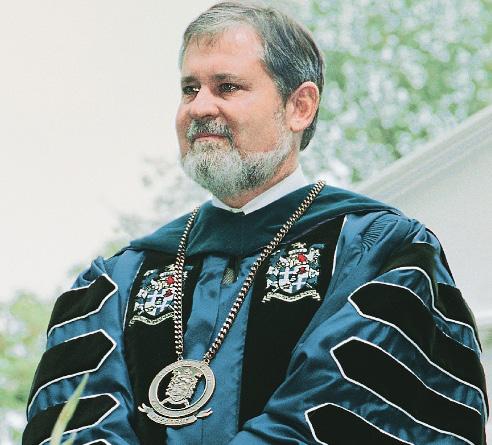
online courses and charter schools. Arnn said this is among the most valuable developments during his time.
The campus itself has changed, too. Arnn said he
thinks it has changed for the better thanks to the faithful service of the administration.
“We cooperate, work hard, and tell the truth. That is very satisfying,” Arnn said.

Michigan’s oldest college newspaper
Since Arnn arrived, Hillsdale has also garnered national attention through its
See Arnn B6
See TeSlaa A10
Former Charger Isaac TeSlaa makes a one-handed catch to score a touchdown for the Detroit Lions on Sunday.
Courtesy | Detroit Lions
Arnn at his innaguration on Sept. 9, 2000. Sabrina Compton | Hillsdale Magazine
Penny and Larry P. Arnn at the Presley Blake Memorial in Spring 2021. Courtesy | Austin Thomason
McMahon speaks at Plaster Auditorium. Courtesy | Roger Hart McMahon shakes hands with Hillsdale Academy kindergartener MacKenzie Thorne. Courtesy | Roger Hart
Iliad, Odyssey coming to Hillsdale online courses in spring
By Ty Ruddy Culture Editor
Hillsdale will release “The Iliad and the Odyssey,” an online course about the two epic poems by Homer this spring.
“They are masterful and delightful stories, essential to understanding Western literature, and books that we require all students at Hillsdale to read,” said Jeremiah Regan ’08, executive director of online learning at Hillsdale College. Dean of Humanities Stephen Smith will deliver 12 lectures on “The Iliad,” and Associate Professor of English Benedict Whalen will give 12 lectures on “The Odyssey.”
Christopher Nolan, a Hollywood filmmaker known for films such as “Inception,” “Interstellar,” and “Oppenheimer,” will release a film adaptation of “The Odyssey” on July 17, 2026. Regan said the College wanted to capitalize on the popularity of what
will probably be one of the highest grossing films next year.
“The impending release of Christopher Nolan’s ‘Odyssey’ movie in July 2026 made the timing right to share Hillsdale’s teaching on these great books with the country,” Regan said.
“This is a wonderful opportunity for me to deepen what I’ve been doing for years in Great Books,” Whalen said. “I emphasized some of the great moments in the text that we cover here in
the core curriculum, but I also did additional background research to shape out these lectures.”
Sophomore Faith Walessa studied the Odyssey in Great Books: Western Tradition with Whalen last spring.
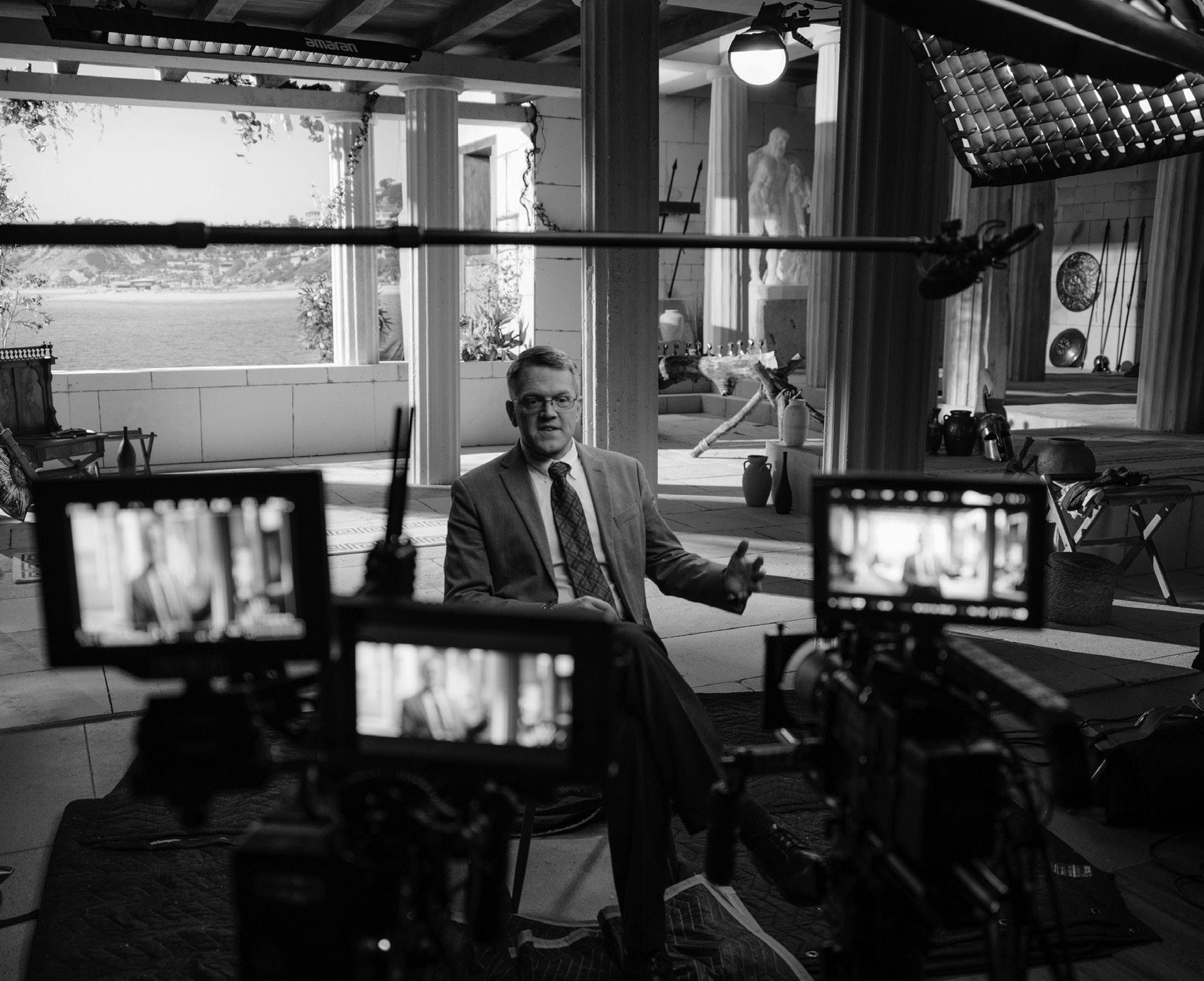
“Reading with Dr. Whalen is what it must be like to read alongside its author,” Walessa said. “I’ve never taken a class that took me so far inside the mind of a writer, with an acute sensitivity to the wit and style of individual words, and their broader implications on questions of human nature.”
For these courses, Hillsdale partnered with Distant Moon Productions, which is also producing the “Story of America” docuseries in conjunction with Hillsdale College and the White
House for the 250th anniversary of America. Whalen said the producers made the sets match the aesthetic of the books themselves.
“They built a Greek temple with statues and a beautiful Mediterranean scene in the background,” Whalen said.
There is more coming from Hillsdale Online Learning. Whalen also said he filmed a course on “Moby Dick” in January, which has yet to be released.
These projects are part of a larger push to make more Hillsdale content available and encourage students around the country to enhance their own education, according to Regan.
“The goals of the courses are to provide a compelling overview of the poems, cause students to fall in love with Homer, and, ultimately, to read the books themselves,” Regan said.
Passages presents students the opportunity to visit Israel
By Sophia Bryant Assistant Editor
Visiting Israel will enrich the faith of students and give them the chance to experience Israeli culture, said Hillsdale professors at an event to promote a college trip over Christmas break.
In the session, Assistant Professor of Religion Don Westblade, Visiting Professor Michael Weingrad, and Israel tour guide Adrian Weisberg spoke about the Passages program, which is an organization that partners with Hillsdale for the trip. Passages aims to prepare college students to be Christian leaders who support the Jewish people.
“You see how this changes their life,” Weisberg said. “Coming to the land, walking
in the footsteps of the patriarchs, in the footsteps of Jesus. It completely changes the concepts that they had in their mind for the way they read the Bible.”
Westblade said Passages is a program dedicated to helping Christian students “see not only the beauty and the history, but the significance of Israel in its context.”
Hillsdale students who are accepted into the program will visit Israel from Dec. 27 to Jan. 6 and see historic and traditional biblical sites such as Nazareth, the Sea of Galilee, the Via Dolorosa, and Jerusalem.
“That’s only half the program,” Weisberg said. “The other half of the program is literally meeting people out of regular Israeli life. You meet Is-
raeli Christians mingling with Israeli Muslims. It’s a kaleidoscope of society.”
Passages students spend Shabbat with a practicing Jewish family. They also meet different Israeli people, such as Palestinians, a Maronite Christian pastor, and members of Israel’s legislature, according to Westblade.
“They’re going to get lots of perspectives on what Israel is, and hopefully in understanding what the place actually is, overcome a lot of the stereotypes that we might have,” Westblade said.
An Israel Defense Forces soldier will also accompany students on the bus for safety reasons, according to Westblade.
“I feel extremely safe in Israel,” Weingrad said. “The Israe-
lis really know how to monitor the current security situation.”
Weingrad, who was in Israel this summer during the war with Iran, said that the Israelis are a people who have known incredible suffering, but have risen to the occasion with compassion for their fellow citizens.
“That’s one of the main reasons that I would really suggest going and going now, because the Israelis offer an extraordinary, palpable day-to-day lesson in how to live life with joy and with gratitude, even under some extraordinarily difficult situations,” Weingrad said. “I know of no other people that loves life as deeply as the Israelis.”
Time is set aside for students to volunteer in Israel as well, so that they can serve communities impacted by the
Alumnus receives award from Hillsdale Federalist Society
By Matthew Tolbert and Sophia Bryant Web & Puzzle Editor and Assistant Editor
The Federalist Society recognized Leo Schlueter ’22 on Sept. 4 for his leadership with the group.
Schlueter is the first recipient of the Brian Zahra Alumni Excellence Award, which is a new recognition the Hillsdale Federalist Society will present to a graduate each year for involvement in the society as an undergraduate and throughout law school. The Federalist Society is a national organization of conservative and libertarian legal students.
Schlueter served as president of the Federalist Society at both the Hillsdale and the University of Notre Dame Law School chapters. He graduated from Notre Dame with a juris doctor degree in May, and is now a clerk for Judge Cristal Brisco.
“As president at Hillsdale, I tried to make it as good of a chapter as I could,” Schlueter said. “It’s biggest potential here is helping undergraduates have vocational discernment about law school.”
The chapter, one of few undergraduate chapters in the country, also wants to recognize recent law school graduates who are moving into professional life, according to junior Bradley Haley, president of the Federalist Society.
“We want the incoming freshmen to be able to see how the Federalist Society can benefit them all the way through their undergraduate time and through law school, if they choose to go that route,” Haley said. “So the award will be a recent law school graduate who’s involved with the Federalist Society here at Hillsdale, and then continues through law school.”
The Hillsdale Federalist
ciety, said Hillsdale’s chapter owes a lot to Zahra.
He was appointed to the Michigan Supreme Court in 2011 to fill a vacancy, and he was reelected to a full term in 2014. He graduated from the University of Detroit School of Law.
“I was truly humbled by the honor of having an award named after me,” Zahra said. “To this point in my life, I
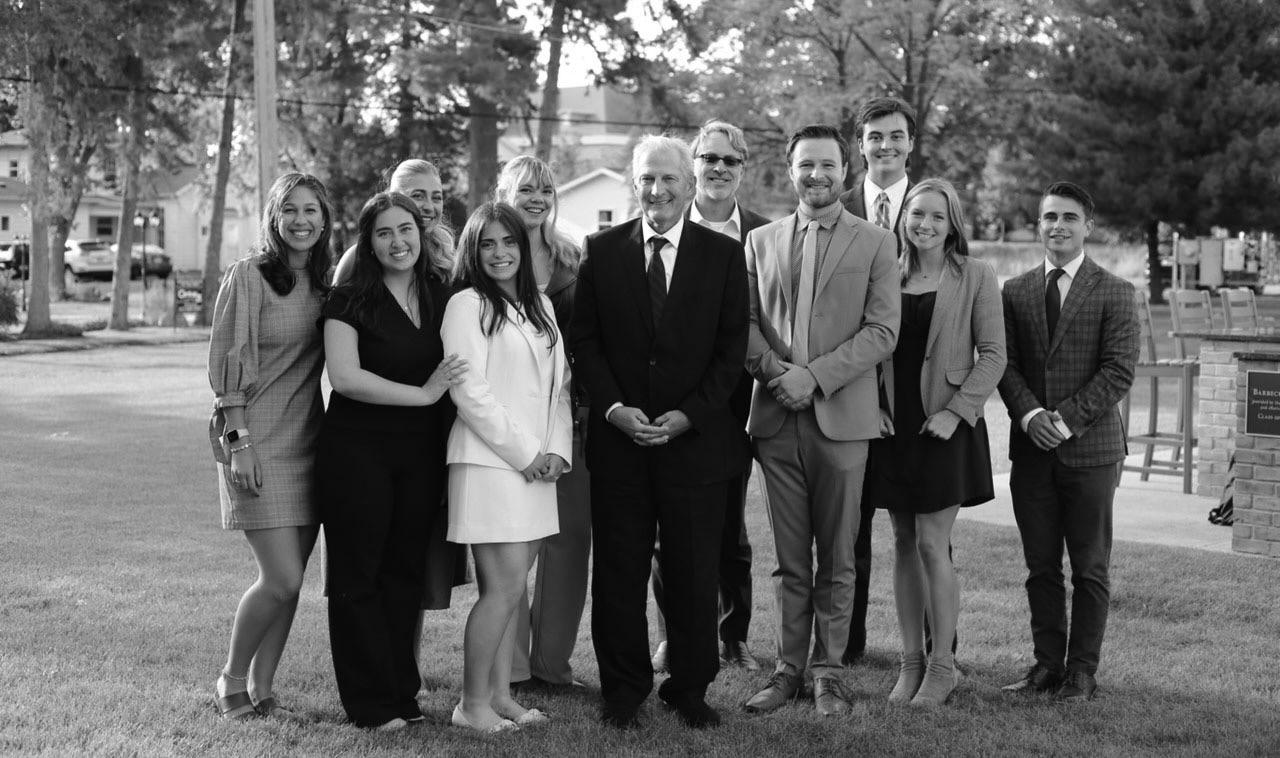
Society named the award after Michigan Supreme Court Justice Brian Zahra, who was instrumental in founding Hillsdale’s chapter in 2016.
“I could not be more proud to be the first beneficiary of an award named after Justice Zahra, who has been a continual example and guide to me in my path to working with Hillsdale Fed Soc, as well as discerning and attending law school,” Schlueter said in his acceptance speech.
Junior Isabella Walsh, vice president of the Federalist So-
would be happy to receive an award. I never thought there’d be a point in my life where actually they’d consider naming an award after me, and it gave me goosebumps.”
Zahra’s parents were born in Malta. He was a first-generation college student while operating a small personal store that eventually developed into a grocery store, according to Zahra. He began visiting Hillsdale regularly after College President Larry Arnn invited him to do research for Hillsdale.
“I came up here regularly to do it,” Zahra said. “And I fell in love with the campus and the students.”
Zahra pushed to start a chapter of the Federalist Society at Hillsdale. His efforts resulted in Hillsdale becoming the second undergraduate chapter of the Federalist Society in the nation.
“He really personifies this Hillsdale ethos of self-giving to support others, to build something great and good, and we would not be here if it was not for him,” Professor of Philosophy and Leo Schlueter’s father Nathan Schlueter said.
Zahra said that he wanted the Federalist Society to begin a chapter at Hillsdale because he wanted to be able to help mentor students.
“One of the things I got out of the Federalist Society is not only a proper understanding of judicial philosophy, it was also networking and finding mentors that I lacked because I didn’t have any lawyers in the family,” Zahra said. “So there’s so many benefits. I strongly encourage you to participate.”
Zahra described Leo Schlueter as someone who also mentored others.
“I want to congratulate Leo,” Zahra said in his speech. “At a young age, Leo, you showed many of the traits that I had. You are a mentor.”
war, according to Weisberg.
“If you go with your church, it’s not going to be anything like the Passages tour,” Weisberg said. “You’ll get more classic Christian sites, but you won’t get that interaction with all the different people of Israel.”
Senior Tully Mitchell, who went on the trip last winter, said she will never read Psalms or the Gospels in the same way as before the trip.
“It was so impactful, Christians have a lot to learn and absorb from Israel,” Mitchell said. “It was very edifying for me, and a great opportunity at a very low cost.”
Applicants must complete a 12-hour course before they receive the link to apply. Students will also complete a capstone project when they return from the trip. The application is due
McMahon from A1
McMahon called for decreasing the number of administrators in education, noting that there are more administrators than educators who can serve as mentors in higher education.
“Saint Paul wrote in his letter to the Corinthians that ‘they had 10,000 teachers but not many fathers,’” McMahon said.
“Plenty of would-be authorities with their own opinions, but few mentors and leaders who would take responsibility for their personal growth. America’s colleges and universities, I think, are facing a similar shortage today.”
McMahon said administrators spend their time on topics like diversity and sensitivity, and micromanaging classrooms.
She also noted that students and their families do not know the names, backgrounds, and biases of these administrators.
“How many true leaders do we really have? How many college presidents, provosts, and other officers with the courage and accountability to deliver on the promises in the college brochoure?” McMahon said.
“Hillsdale College and a few other proud institutions are swimming against the current tide, proving that leaders can be more than figureheads.”
The college culture and purpose has also changed, according to McMahon. She said colleges have lost their importance and pride in the communities around them.
“They were on the cutting edge of research and intellectual movements, producing the movers and shakers of every
on Oct. 1.
“They’re not really looking for people who just want a nice vacation,” Westblade said. “They’re looking for people who will come back and advocate for the truths of what Israel really is.”
The trip, which is worth about $7,000, only costs students $980, according to Westblade.
“They said that visiting Israel was the fifth gospel, that you think you can understand what’s going on in the Scripture, but you get so much more when you’re actually on the ground,” Weisberg said. “Even, to be specific, with so much, for example, topographical information in Luke’s gospel.”
domain and discipline,” McMahon said. “What is the difference between attending Hillsdale College and almost any other university today? At Hillsdale, this is still what the college experience is like.”
The liberal arts, including the sciences, must all aim for the same end and have the same level of difficulty, according to McMahon.
“Every discipline, whether it’s the humanities or the hard sciences, should apply the same level or rigor as medicine or engineering programs that have developed a reputation of obfuscation or ideological conformity must raise the bar when they need to disappear,” McMahon said.
“Higher education’s greatest successes have come when its luminaries strove to transcend their biases, uncovering objective truths that advanced humanity’s understanding of the world.”
Colleges also must teach civic leadership and duties to ensure pride and knowledge of the functions of the nation, according to McMahon.
“Our nation’s history, laws, and culture are complex, and we need graduates who dive deeply into the principles of the American founding and the whole history of the West, ready to navigate its challenges with wisdom and courage and critical thinking,” McMahon said. “The best way for university leaders to influence the national discourse is by producing experts, critics, innovators, and entrepreneurs who carry forward this mission.”
Hillsdale’s Federalist Society Board takes a picture with Schlueter and Zahra.
Courtesy | Evelyn Shurtliff
Benedict Whalen on “The Iliad and the Odyssey” set.
Courtesy | Jeremiah Regan
Speakers discuss American foreign policy, history in CCA I
By Skye Graham Social Media Manager
A lineup of speakers including a Hillsdale alumnus and the former prime minister of the U.K. addressed American involvement in Asia, Europe, and the Middle East in the first Center for Constructive Alternatives lecture series of the school year.
The CCA, titled “Issues in International Relations,” ran from Sept. 7–10.
Casey Wheatland, assistant professor of political science at New College of Florida, opened the CCA with a lecture entitled “Foreign Policy and the Constitution.” Wheatland, who holds a Ph.D. in political science from Hillsdale’s Van Andel Graduate School of Statesmanship, argued American foreign policy must align with American interests.
“China, our No. 1 geopolitical rival, has spent hundreds of millions of dollars in recent years lobbying our policymakers, and has infiltrated sensitive political, technological, and military sectors,” Wheatland said.
Foreign lobbying always poses a threat to American sovereignty, no matter the country engaging in it, according to Wheatland.
“Nations that we often count among our greatest allies or as special friends also engage in espionage,” Wheatland said. “And when it comes to foreign influence, sometimes our friends can be even more dangerous than our enemies. We must remember Washington’s advice to avoid permanent love or enmity towards any nation or nations that subvert our sovereignty by means of corruption, lob -
bying, or espionage.”
Former U.K. Prime Minister Liz Truss spoke Sunday night about the shared history and values of the United States and the United Kingdom, as both nations have roots in the Magna Carta and British common law.
“Of course, our two constitutions are different,” Truss said. “But nevertheless, the underlying principles remain the same. And it’s these principles that have enabled Great Britain and the United States to thrive.”
Truss urged the importance of maintaining a strong relationship between the U.S. and the U.K., saying both of them share similar threats like political radicalism and violence.
Christopher Caldwell, contributing editor at the Claremont Review of Books, argued in his lecture Monday
that many European leaders do not want the Russia-Ukraine war to end, while Trump is pursuing peace between the two nations.
“Now, the Europeans say publicly that they are sincerely worried that Putin is going to invade their countries,”
Caldwell said. “Other people say that the European attitude has something to do with Trump and a desire to drive a harder bargain with Trump in some future context. I actually believe it has something to do with their own politics.”
Caldwell explained the dire economic and political situations of many countries in Western Europe, including France and the U.K. According to Caldwell, European countries are spending time and money responding to the situation in Russia and Ukraine rather than address-
ing issues facing their own countries, such as mass migration and economic collapse.
Brian Kennedy, president of the American Strategy group, spoke on China’s Belt and Road Initiative, which is a term used for China’s investment in infrastructure projects across the world, particularly in developing nations. Kennedy argued that this initiative is dangerous because it strengthens China’s place in the world.
In the final lecture, Martin Kramer of Tel Aviv University argued in favor of American support for Israel. He argued widespread misunderstanding of the situation in the Middle East has led to chaos and surprises in the past. Israel and the Middle East, he said, are an appendage of the Western power system. Culturally, the Christian holy places in Jerusalem make the region part of
Europe’s moral geography. “Israel’s existence has kept alive the conviction, not only among the Jews, that the destinies of the West and this region remain unsettled,” he said.
Freshman John Gardner said he wished the lectures focused more on practical solutions for foreign policy issues.
“While most of the speakers were entertaining, few made an effort to engage with the subject matter,” Gardner said. “Many already wellknown problems were brought up as if for the first time, but no new ideas or even perspectives were introduced.”
The next CCA, “U.S. Economic Policy: Great Society to the Present,” will run Nov. 2–5.
Ancient algae fossil named after biology professor
By Quinn Delamater Senior Reporter
An ancient species of algae will now carry the name of Professor of Biology Anthony Swinehart, following his discovery of the fossil and publication of his research last month.
Swinehart discovered the Earltonella swinehartii in a quarry in the Upper Peninsula of Michigan in 2023. It lived more than 440 million years ago and developed an intricate design, before a large extinction event, according to Swinehart.
“We think that those changes were brought on by
Kirk spoke at Hillsdale’s National Leadership Seminar in Phoenix in February.
“He’s important, and he’s a good man, and that’s so important,” Arnn said as he introduced Kirk at the seminar. “I think it’s true if we manage to save our country it will be as glorious as the achievement of Abraham Lincoln. I think it will be as hard as that, and I think all of us who help will be remembered. And that will include Charlie Kirk.”
Known for openly questioning the value of a college education, Kirk said Hillsdale is an exception.
“I can tell you if every kid who’s currently in college took the Hillsdale online courses instead of going to that fouryear college, America would be a much better place,” Kirk said in his remarks in Phoenix.
Several current Hillsdale students count Kirk and Turning Point as part of their political and educational formations. Junior Nathan Furness founded Grand Rapids’ homeschool Turning Point chapter in high school, which he said helped him further his commitment to conservative values.
“Kirk’s legacy will live on through an organization that truly cares about the next generation,” Furness said. “I think the most important thing, be-
an increase in specialization of the herbivores like snails and things, and the complex branching in the algae may have, in some way, helped impede herbivory,” Swinehart said. “So, it adds a lot to our knowledge about how species evolved and adapted in this critical time period.”
Swinehart began visiting the Upper Peninsula in 2018 to search for fossils.
“Dr. Swinehart lives and breathes science, and this is reflected not only in his role as a professor and museum curator, but also in his hobbies including aquaria, model making, hobby farming, and even where he stops on vaca-
fore trying to address all the issues in our country that are highlighted by this tragedy, is that we remember and mourn Charlie Kirk. No words can describe the shock and sadness we feel for losing a man who was actively changing lives one college campus at a time.”
Sophomore Georgiana Tillman, who ran a Turning Point chapter at Grace Christian Academy in Franklin, Tennessee, said Kirk was an inspiration to her generation because of his firm stance on Chrisitan values and Biblical truth.
“The act of violence that claimed Charlie Kirk’s life today is the very thing he devoted his public career to ending: brutality over discourse,” Tillman said. “In the wake of this tragedy, I pray that we see in America’s youth a renewed love for the truth and a courage to tell it.”
Sophomore Phoebe Warren heard Kirk speak this summer at a Turning Point women’s conference.
“I loved seeing how Charlie Kirk encouraged everyone, regardless of their feelings toward him or his party, to be informed of the facts,” she said. “His love for good conversation is what constantly reminds me how blessed I am to study at an institution that he loved for that very reason.”
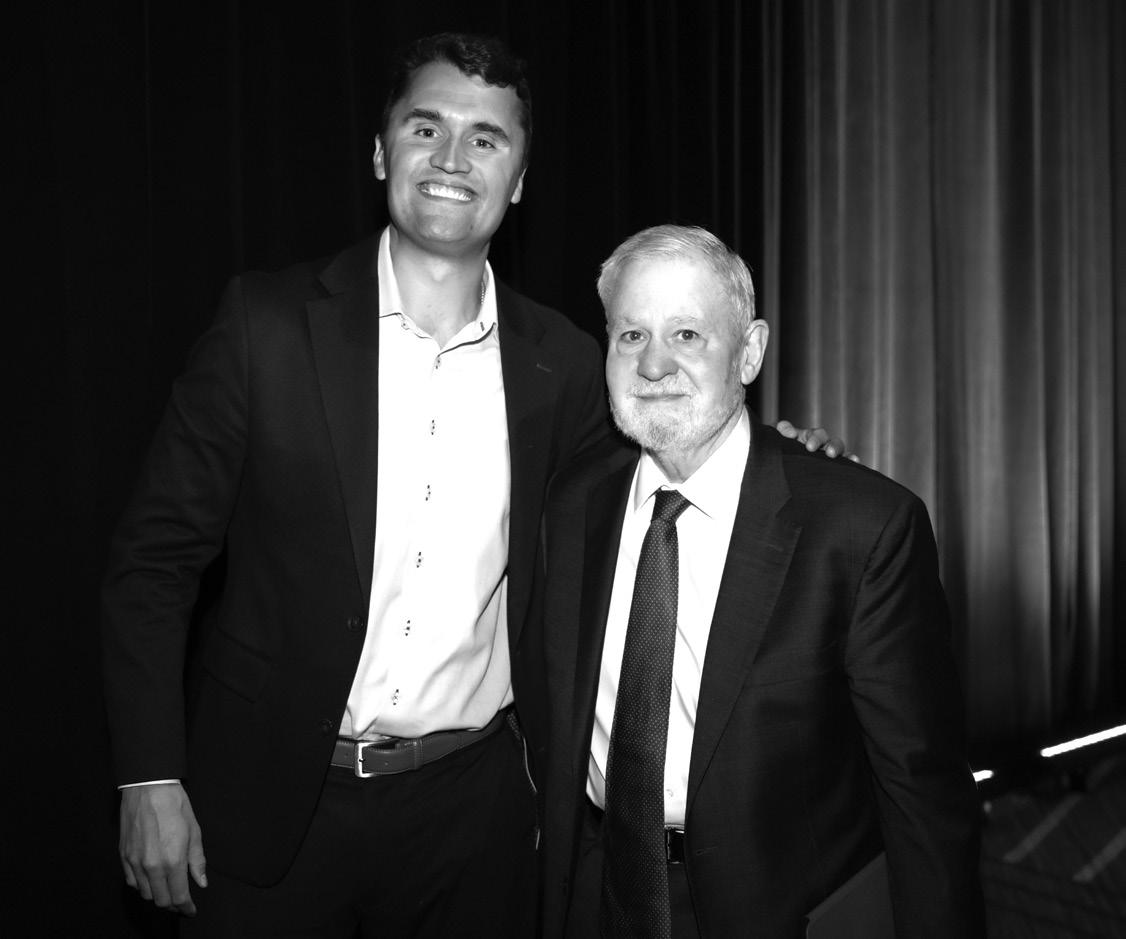
tion. ‘Dinosaur museums, anyone?’” said Matt Hoeing ’13, a former student of Swinehart.
“He holds both himself and his students to very high standards when pursuing science, and it’s important to him that his students take the subject as seriously as he does.”
Swinehart’s fossil came in the form of a rock with the carbon residue of a soft bodied algae, which is rare in the quarry.
“Most people, when they think of algae, they think of just green slime,” Swinehart said. “These had blades and they looked like plants.”
Steve LoDuca, professor of paleontology, sedimentology
and stratigraphy at Eastern Michigan University, was with Swinehart at the quarry the day of the discovery. LoDuca confirmed that the residue was algae. He published research about the fossil in August, and named the specimen after Swinehart, in the Journal of Paleontology.
Swinehart gave half of the original rock specimen to LoDuca and it is now at the University of Michigan.
Swinehart’s half is on display at Hillsdale College’s Daniel M. Fisk Museum of Natural History.
“Dr. Swinehart is passionate about his work and so deserving of the honor of having a
fossil named after him. He is very driven and an expert in his field of study,” said senior Arden Carleton, who is advised on her senior thesis research by Swinehart.
In 2021, Swinehart found another new species, the hickory tree carya pipecreekensis.
“All my life, I dreamed of describing my own new species that’s never been described before, and this was probably the best opportunity — maybe the only opportunity — I’ll ever have,” Swinehart told The Collegian at the time of the tree discovery.
As a child, Swinehart said he liked to joke that he discovered a new species every time he found one he didn’t recognize, calling it “Swinehartii.”
“It’s a bucket list item that I never bothered to put on the bucket list because I figured it would never happen,” Swinehart said.
Swinehart said he is honored that LoDuca named the fossilized macroalgae species after him. “My dad recently died, and it’s his name too, so it’s a way to remember him.” Swinehart said. “My dad was so encouraging in terms of making sure I went to college and helping me through college. We weren’t rich, so there was a lot of sacrifice there.”
‘Forbidden Humor’: class offered about SNL

By Grace Brennan Assistant Editor
Scot Bertram has watched every episode of “Saturday Night Live.” It took him two years to watch 50 seasons with 1,000 episodes.
“People said it couldn’t be done,” Bertram said, who is General Manager of Radio Free Hillsdale 101.7 FM. “In fact they said it shouldn’t be done, and yet we proved them wrong, because we did it.”
His podcast “Wasn’t That Special,” co-hosted by Christian Schneider of the Pacific Legal Foundation, reviews, ranks, and discusses all things encompassing SNL.
Now that Bertram knows more about SNL than most cast members do, he is teaching a one-credit class titled “The Forbidden Humor of SNL.”
The class seeks to answer two questions about the political and cultural side of SNL, according to Bertram. The first question comes from the well-known fact of SNL primarily having a liberal bias.
“But the perspective of the show writ large has always
been from the left liberal worldview,” Bertram said.
“But there have been very good, very funny sketches throughout history in which they have a conservative or libertarian perspective or making fun of the left, which is not what they normally do.”
Bertram said he plans to ask his students what led SNL to sometimes switch up the political side they wanted to make fun of.
“Why did they do it? Was it funny?” Bertram said. “What was happening in the world or the country at that time that made them comfortable enough to step out from that worldview to say ‘Maybe this is another way to look at it. This is actually funny.’”
The second question comes from analyzing episodes that Bertram said SNL wishes were forgotten because they aged poorly as culture has shifted. Jokes that used to be funny are now considered offensive; Bertram and his class are going to analyze why that is.
SNL is important because of its documentation of pub-
lic thought in moments of political and cultural events, according to Bertram.
Since the show ran weekly, every sketch was a humorous tribute to that week’s news.
“You really see this sort of visceral response to things that are happening, whether it be in culture, politics, or news, they’re reacting in real time,” Bertram said.
Bertram explained how comedy peaked during SNL seasons 14-17 and is now failing both inside and outside of SNL. The world of comedy outside of SNL has shifted — there are no longer sitcoms like “Cheers” and “Seinfeld” on platforms like CBS and NBC — and comedians have nowhere to go outside of SNL and stay on as cast longer than they should.
“There’s nowhere to jump off and continue to be funny comedians,” Bertram said. “So people are staying much longer on the show. And since people are staying much longer, you have these expanded casts, and that’s been a change for the worse.”
According to Bertram, another reason SNL is not as funny as it used to be is due to the departure of writer Jim Downey and a shift in the political writing.
“They started to write politics in a different way, which was instead of having a perspective on something that happened, or taking something that happened and
sort of moving it to a logical next point, they essentially started reenacting things that happened during the week,” Bertram said.
When SNL first started, the normal platform for a comedian was on the stage or in a sitcom. Now, younger generations find comedy in 10-second clips on Instagram and TikTok. Humor is always shifting, and the students of Bertram’s class are ready to find out why.
“I’m excited to see what he’s pulled out for what he considers forbidden comedy,” Senior Megan Pidcock said. Pidcock, senior producer at the college’s radio station, has worked with Bertram for years and knows his enthusiasm for SNL from past conversations.
“It seems fun to go to a class once a week where you laugh at something or don’t laugh at something, and then talk about why you did or didn’t laugh at all,” Pidcock said.
Sophomore Sophia Carey said she grew up sneaking around her parents to watch SNL with her older sister.
“We called it ‘snail’ because we weren’t allowed to watch it,” Carey said. Now that Carey no longer has to hide the fact that she loves watching SNL, she said she is ready to have a greater appreciation for all that goes into the show.
“I think when people think of SNL, they just think of basically a cracked-up writing machine,” Carey said. “But there’s so much technical stuff that goes on, like what makes everything work, that I think I’m going to have a greater appreciation for not just the writing and the structure of the jokes, but also everything that goes on in the production of the show.”
Kirk from A1
Kirk and Arnn pose for a photo at a Hillsdale event in Phoenix, Arizona, in February. Courtesy | Austin Thomason
Bertram in front of the SNL Fan Shop at Universal Studios Orlando. Courtesy | Scot Bertram
Opinions
(517) 607-2415
Online : www.hillsdalecollegian.com
Editor-in-Chief | Thomas McKenna
Executive Editor | Moira Gleason
Design Editor | Anna Broussard
Senior Editor | Catherine Maxwell
News Editor | Ellie Fromm
Opinions Editor | Caroline Kurt
City News Editor | Alessia Sandala
Sports Editor | Elaine Kutas
Culture Editor | Ty Ruddy
Features Editor | Megan Li
Social Media Manager | Skye Graham
Circulation & Ad Manager | Frederick Woodward
Assistant Editors | Christina Lewis | Sophia Bryant | Elijah
Guevara | Lewis Thune | Adriana Azarian | Gemma Flores | Christian Papillon | Jamie Parsons | Lauren Bixler | Grace Brennan
D.C. Correspondent | Tayte Christensen
Web & Puzzle Editor | Matthew Tolbert
Illustrator | Maggie O’Connor
Faculty Advisers | John J. Miller | Maria Servold
The editors welcome Letters to the Editor but reserve the right to edit submissions for clarity, length, and style. Letters should be 450 words or less and include your name and number. Send submissions to the Opinions Editor at ckurt@hillsdale.edu before Saturday at 3 p.m.


A culture of death claims Charlie Kirk
By Caroline Kurt Opinions Editor
The only proper response is, “Oh, my God.”
On Wednesday afternoon, Charlie Kirk, founder of Turning Point USA, was shot dead.
The conservative commentator was answering questions from students at an outdoor event at Utah Valley University when someone fired at him. Footage showed Kirk’s neck jerk backward. He was taken to a hospital and, later that afternoon, died.
Kirk was 31 years old, a husband and father of two toddlers. He leaves behind a family who loves and needs him, and doubtless many friends. Like many other politicians and commentators, Kirk’s outspoken activism makes it easy to forget that he is a human being first — a political figure second.
I have criticized Kirk’s ideas on the Opinions page in the past. But nothing he has ever said or done could justify this shocking and wicked act of violence.
In the days and weeks after this tragedy, news outlets and commentators will run to pin the blame for this shooting on various political movements and ideas — even Kirk’s own rhetoric. Before news broke of Kirk’s death, political strategist Matthew Dowd speculated on air Wednesday that Kirk’s “hateful speech” led to his shooting.
Some of this blame lies with the trend, dating back to the 1960s, of intellectuals justifying protester violence. As columnist Daniel Henninger wrote after the shooting of abortion doctor David Gunn in 1993, once the justifications started, they never stopped.
“The personal virtue known as self-restraint was demolished,” Henninger wrote in an editorial for The Wall Street Journal. “We were repeatedly lowering the barriers of acceptable political and personal conduct.”
This demolished a vital set of guardrails around American civic life — one of the reasons commentators like
Tongues of fire: Hillsdale needs a Biblical Languages minor

By Blake Schaper Collegian Freelancer
Dowd so freely place the burden of an innocent man’s killing on the victim himself.
While there are observable trends in modern American political violence, we must remember that no statistic can account for the battle that rages in each human heart between good and evil, peace and violence, dignity and inhumanity.
The shooter, barring some extraordinary mental illness, bears the guilt for this sin. Yet at the same time, we cannot isolate this action from the culture of death in which we are immersed. Pope St. John Paul II coined the term “culture of death” to describe a society in which human solidarity and dignity are denied in favor of efficiency and the law of power. We see this everywhere: abortion, euthanasia, human trafficking, third-party reproduction, and, undoubtedly, political violence.
We cannot too quickly equate words with violence, as many on the left have attempted with the “silence is violence” slogan. But the ugly and violent rhetoric we take for granted on the internet isn’t harmless, either. It shapes the way we think — shapes, even, the way we talk in real life about the world. It encourages us to adopt a worldview that assigns dignity to people based on their views or usefulness to us, further propagating this culture of death. None of us are totally innocent of this.
In a culture of death, no one wins. Not the shooter, not the victim, and certainly not the actual and virtual bystanders. The violence merely spirals, as Americans have witnessed too many times in the past month. Hell is a real place — we catch glimpses of it on earth.
This is not who we are as Americans, but even more fundamentally as human beings. Charlie Kirk believed in redemption, nationally and spiritually. May we live to carry it out.
Caroline Kurt is a senior studying English.
“We all have sinned.” “Formless and void.” “It is finished.” Christians may know these familiar phrases from the Bible. But to understand what they really mean, students need an extensive knowledge of biblical languages, an area of study Hillsdale College should develop.
Sin, as it is commonly written in the original biblical Greek, means both a missing of a mark — such as when an archer just narrowly misses a bullseye — and a tragic flaw that destroys the protagonist. “It is finished” — the last phrase Jesus uttered — is a legal term meaning to completely wipe someone’s debts away. “Formless and void” is a Hebrew word rendered “tohu wabohu” in English, meaning a combination of chaotic nothingness. As biblical scholar Marty Solomon put it, “If you put nothing in a blender, and hit ‘WHIP’, you get tohu wabohu.”
Examining the original language of the Scriptures —
Greek, Hebrew, and Aramaic — gives students a depth of understanding they miss by only reading the Bible in English. Learning these languages opens the door to a richer theology, furthers understanding of Western civilization, and aligns perfectly with Hillsdale’s mission. Hillsdale College needs a specified Biblical Languages minor.
Christian theology is foremost among the academic pursuits, as it is the only one that teaches mankind how to gain eternal life. Being versed in biblical languages allows one to see the beauty of the Scriptures more clearly. Believers can find teachings they have missed in the major biblical narratives through methodical analysis of the original texts.
Biblical studies also allow students to analyze literary works that cast light on Christian teaching and practice. Early Christian texts like the “Epistle to Diognetus” give early evidence for the Church’s pro-life stance. The Hebrew Talmud, the oldest commentary on the Bible, shows how
the original Jewish audiences understood the Old Testament. Learning Hebrew can also help students understand Jewish society and culture, the context of the Holy Scriptures.
Finally, having a Biblical Languages minor will foster the college’s mission. Hillsdale’s second president and former Greek teacher at Oberlin College, Edmund Burke Fairfield, noted the word choice found in Psalms 137:16 and Romans 13:4 formed the basis for his belief in Christian patriotism. Ransom Dunn, “The Grand Old Man of Hillsdale,” referred to God as the Greek “Theus” at the start of his work on systematic theology. Hillsdale’s founding fathers were Baptist ministers who took basic knowledge in the ancient Scriptures as a given.
A Biblical Languages minor will help students align with their aspirations and values. While it is true that biblical Greek is taught here already, it is usually grouped with other Ancient Greek dialects. This can be confusing, as grammar and spelling differ greatly between them. A specific minor
in biblical languages would persuade students to return to these courses in Hebrew and Greek.
Professor of Theology Donald Westblade said that since the teaching of languages such as Greek moved from the theology to the classics department, many students have stopped taking them. Currently, students who wish to specifically study Greek for biblical understanding may have to take three semesters of Homeric Greek superfluous to theological study. Finally, there are no classes for Aramaic, preventing students from gaining an understanding of biblical books originally written in that tongue, such as Daniel and Ezra.
The study of biblical languages is the cornerstone of a richer understanding of Christian theology and church history, integral to Hillsdale’s founding. These courses are sadly unavailable to the students who would benefit from them. It is vastly important that Hillsdale have an independent Biblical Languages minor. By restructuring our teaching of these ancient tongues, we will foster more mission-oriented, Christ-centered learning at the college.
Blake Schaper is a freshman studying the liberal arts. Illustrated by Maggie O'Connor.

Christians, break bread with other denominations
By Elijah Guevara Assistant Editor
Of the many things that make Hillsdale Hillsdale, one of the most obvious is our deeply religious campus culture. From heated lunch table debates to 2 a.m. dorm room theology, faith permeates our everyday life. But the very forces that encourage faith to be a natural part of student life can also make Christianity feel stale.
Over time, even on an exceptionally devoted campus — maybe because it’s an exceptionally devoted campus — our theological debates become banal, the transcendent becomes cliche, and our religion quickly loses its wonder. After enough arguments about Martin Luther and indulgences, the idea of hearing what other Christians have to say might make your eyes roll — at a certain point, haven’t we heard it all?
Yet our faith bears unending fruit, and even on a campus as small and sometimes
divided as ours, there is always a way to make more out of our shared religion. One way to do this, and to revitalize our Christian perspective altogether, is to join other students’ religious groups for prayer — especially groups that fall outside of our own denominations or traditions. This could be done in small ways, such as joining your dorm’s nondenominational Bible studies, praying with the Lutheran Society for Evening Prayer, attending the Anglican-inspired Evensong in Christ Chapel, or going to a Catholic Society Convivium. Although at first some may see Hillsdale’s diversity of traditions as a barrier to communion, by choosing to pray with others, it can instead become a way to deepen wonder and appreciation of the faith. We can find something critical to our lives as Christians and simply as human beings: perspective. No matter our Christian background, we are not above others, and we can always
grow in our understanding of each other. Through my time at Hillsdale, I’ve found that putting down the sword to instead join others through song, prayer, and fellowship has helped me better understand where they’re coming from. Most importantly, a newfound perspective can help us grow in charity toward people whom we might otherwise just see as “different.”
Being open to unfamiliar traditions or practices that fall outside our comfort zone can also enrich our own spiritual lives. A Protestant may find the solemnity and ritual of Eastern Orthodox vespers to be fruitful, while a traditional Catholic may benefit from experiencing a more emotional connection to God through modern forms of praise and worship. Prayer and sacred music, especially, can work powerfully to open our minds between faith communities. Whether we’re singing “Amazing Grace” or the Doxology, standing
shoulder to shoulder with others to praise God through song can help us even momentarily forget about our theological differences. We may even begin to realize we all have much more in common than not.
While this doesn’t necessarily mean we need to recite the Hail Mary with Catholics or celebrate Reformation Day with Protestants, taking opportunities to pray with others allows us to rise above our entrenchments and increase our Christian perspective. Hillsdale’s diversity of Christian convictions is an integral part of campus life, and it won’t be going away anytime soon. But by giving ecumenicalism a chance with other Christian denominations, we can open ourselves to other new and wonderful perspectives that our campus still has to offer.
Elijah Guevara is a sophomore studying the liberal arts.
Buy stocks, not Taco Bell: Invest as a student
By Jacob Waldvogel Collegian Freelancer
Putting money into a checking account is akin to burying your talents, except the talents waste away slowly in the dirt.
Minute by minute, the cold, hard cash you earn from your job loses its spending power. Whether you put it in your checking account, hoard it in Venmo, or just keep it on hand, those stagnant savings are fighting a constant enemy: inflation.
The Federal Reserve attempts to regulate a steady rate of 2% annual inflation, maintaining that this yearly increase is healthy for a stable economy.
Though inflation is regulated, it will still eat away at your savings. Investing isn’t just about making money. On a more fundamental level, it’s about retaining the value your savings currently hold.
Fortunately, there are safe ways to store money in lowrisk funds that will grow in proportion with the overall growth of the general mar-
ket, outpacing the rate of inflation in the long term. Roth IRAs and 529s, for example, are plans that reserve savings for educational spending and retirement, and they include the added bonus of allowing for withdrawals to be made tax-free.
The setback is that funds from these plans can only be drawn out tax-free when used for their intended purposes. But even with this limitation, plans like Roth IRAs and 401(k)s are still safer retirement savings options than Social Security.
Considering that the set age for eligibility on Social Security withdrawals was adjusted beginning in 1983, the program’s security will continue to deteriorate in competition with inflation, cost of living, and population growth in both the short and long term.
Luckily for students, because of a decision made by the Department of the Treasury in 2004, the cash they earn through student employment is exempt from the FICA taxes that contribute to
Social Security and Medicare. This conditional tax exemption offers a chance to pocket some extra cash, but that same money could instead be placed in a retirement fund that is safer and more personalized than Social Security.
Because students cannot even contribute their campus employment earnings to Social Security, it is prudent to take whatever would be lost in self-employment tax and deposit it into a personal savings account instead.
Though individuals can open Roth IRAs at any age, contribution limits and the effect of time on compound interest benefits students who invest early rather than just waiting for a steady income after graduation.
The amount of post-tax income that can be deposited into a Roth IRA is set at a yearly limit of $7,000. While it may be unreasonable to expect students to deposit the contribution limit every year during college, depositing as much as possible in a given year builds a savings account in preparation of the limita -
tions that are placed on future years.
Additionally, the effect of time on longterm compound interest ensures that the best kind of investments are the ones made as soon as possible. If you deposit $7,000 every year until retirement and expect an annual compound interest rate of 8%, the difference between savings started at the age of 18 and 22 would be upwards of $400,000.

Even though it may require saving a dollar here instead of spending a dollar there, the added benefit of a few extra years gaining interest is well worth it, and the sacrifice of
Republican Medicaid reforms were too modest Slash foreign aid, not Medicaid: Cuts are foolish
By Thomas McKenna Editor-in-chief
To hear Democrats and the press corps tell it, Republican lawmakers took away healthcare from millions of poor and disabled people this summer. “People will die,” Democratic House Minority Leader Hakeem Jeffries said in May.
“Trump’s Bill Slashes the Safety Net,” The New York Times wrote in June.
But push aside the rhetoric and look at the actual changes. The three key Medicaid reforms GOP lawmakers passed in July were modest: ensure able-bodied adults without children are working or volunteering part-time, take illegal immigrants off the benefit rolls, and check the eligibility of recipients more frequently.
As the program dives toward fiscal insolvency, these reasonable changes aimed to save Medicaid for the people it's meant to help: poor, disabled, and truly vulnerable Americans. Opponents trotted out a scary number from the Congressional Budget Office: Republican Medicaid reforms would leave 7.6 million people without health coverage.
But of those 7.6 million, 4.8 million were able-bod -
ied, prime-age, childless adults whom the CBO expected would refuse to work or at least volunteer 20 hours per week. Another 1.4 million were illegal migrants or others ineligible due to immigration status. About 1.6 million of the newly uninsured would be caught by other safety-net programs like Obamacare coverage.
Republicans could have gone further. They shrank from more substantive reforms to Obamacare expansion subsidies, federal reimbursement rates, and the “provider tax” spending loophole. That didn’t save them from the usual browbeating. In a floor speech after the bill passed the House, Jeffries still accused GOP lawmakers of “ripping healthcare away from the American people.”
There are lessons for Republicans here. For one, no matter how modest the reform, GOP lawmakers will incur the same political cost. This summer, they chose the worst of both worlds, taking the expected smearing but securing only modest reforms.
Most Republicans also did their best not to talk about Medicaid when it could have been a political winner. Did you ever hear
about these reforms from Republicans? They could have pointed out that Democrats were in favor of illegal migrants and able-bodied, childless adults receiving Medicaid benefits. Instead, Republicans convinced themselves they were losing whenever they uttered the word “Medicaid” and ceded the debate to Democrats. If work requirements are our new definition of cruelty, then every U.S. entitlement program is destined for insolvency. The growing national debt is an old story. Medicaid spending has grown by 60% since 2019 and will continue to grow even after the new changes. Welfare programs make up nearly two-thirds of federal spending every year, far outpacing defense, foreign aid, and any other type of expenditure.
It may take a catalyzing crisis to rally an apathetic majority to end this nosedive toward fiscal bankruptcy. But someday, even in Washington, austerity will be in fashion.
Thomas McKenna is a senior studying political economy.
By Joshua Mistry Collegian Reporter
The Medicaid cuts in the One Big Beautiful Bill Act are a good move made by the wrong people at the wrong time.
Entitlements are certainly a huge problem for the American federal government, accounting for approximately 46% of the federal budget, according to the Center on Budget and Policy Priorities. Since the year 2000, Medicaid programs have cost the American taxpayer roughly $14.6 trillion adjusted for inflation. Conservatives should confront the waste, fraud, and abuse in these programs, but only within an overall plan to balance the whole budget.
The One Big Beautiful Bill Act is estimated to add $4.1 trillion to the federal deficit over the next decade, according to the Committee for a Responsible Federal Budget, by making the 2017 Jobs Act tax cuts permanent and adding billions to defense and immigration budgets.
Medicaid has cost nearly $15 trillion since 2000. However, the Republican Party has authorized that same amount across pandemic relief aid ($3.6 trillion), foreign aid ($1.2 trillion), and wars in the Middle East ($10 trillion). Clearly, they have no qualms
about that level of spending.
Since President Donald Trump's victory in 2016, the Republican base has shifted against interventionist foreign policies. A Pew Research poll from May found that more than two-thirds of Republican voters want the federal government to “pay less attention to problems overseas and concentrate on problems here at home.” A FabrizioWard poll from April showed that 49% of Trump voters were opposed to Medicaid cuts, as opposed to 39% in support.
Republicans shouldn't base their policies on public opinion, but younger voters, especially conservatives, are turning against an American foreign policy that aims to regulate global affairs. Voters under 25 are much more passionate about having a government whose public image and bent is to benefit the American people domestically. Republicans will not continue to win elections by cutting taxes and entitlements without making substantial change to foreign-policy-directed spending.
Conservatism that seeks to cut domestic spending must first look to wasteful foreign spending that does not keep us safe and has only destabilized an entire region of the world. The message that Re -
publicans send to the American people when they authorize billions more in aid to Ukraine and Israel while cutting healthcare for American citizens is not that they care about balancing the budget or prioritizing federal spending to benefit Americans.
If Republicans ignore changing opinions among younger voters, they will cede ground to left-wing voices that advocate for increased domestic and foreign spending. Republicans will lose the ability to balance the budget while Democrats will have the votes to advance heavy entitlement spending. By prioritizing foreign spending cuts, Republicans can win elections, cut spending, and then make the argument for entitlement cuts.
The future of the postTrump Republican party will be decided in the 2028 election. If they want to build on the successes of the Make America Great Again movement, Republicans must prioritize Americans.
Joshua Mistry is a senior studying politics.
is right: Physics belongs as a liberal art
When we picture liberal arts, we usually envision discussions on the merits of Aristotelian philosophy, studying Homer’s epic poetry in its native language, or having that third debate on predestination versus free will.
College President Larry Arnn doesn’t. At this semester’s first senior capstone lecture, he said physics and mathematics are the “most liberal of the liberal arts.” They epitomize what the liberal arts are about: the pursuit of universal truth through observation and logical thinking about natural phenomena.
Students who value the liberal arts tradition must first attempt to understand the logical basis of the physical world before they can hypothesize about the abstract one. Even classicists and philosophers benefit from a fundamental understanding of physics. By studying the mathematical proofs that explain how the universe works, non-scientists can see empirical applications of the logic they use in metaphysics. As Galileo Galilei wrote in a 1623 treatise on astronomy, “Philosophy is written in this grand book, the universe, which stands continually open to our gaze. But the book cannot be under-
stood unless one first learns to comprehend the language and interpret the characters in which it is written. It is written in the language of mathematics, and its characters are triangles, circles, and other geometrical figures.”
Until the 19th century, scientists were called natural philosophers because they, like the thinkers who studied morality and theology, were attempting to extrapolate universal truths from nature. Often, the natural and moral philosophers were the same people. Tradition says that engraved on the doors of Plato’s Academy were the words “Let no one ignorant of geometry enter.” While remembered more
for their political philosophies, Plato and Aristotle were both prolific natural philosophers. Plato’s “Timaeus” proposed the theory of Platonic solids — geometric shapes that act as the basis of all matter — which can still be related to modern particle physics. Aristotle wrote a whole tome about his exploration of physics, biology, and chemistry. The details of their theories were wrong, but the fundamental rationale still holds.
The mathematical consistency isn’t only beautiful — it acts as a revelation of a higher order.
As French mathematician Henri Poincaré put it, “The scientist does not study nature because it is useful; he
studies it because he delights in it, and he delights in it because it is beautiful … that deeper beauty coming from the harmonious order of the parts, and that a pure intelligence can grasp.”
The formulas can convey the hidden properties of the universe in just a few symbols, and every symbol has a purpose. Every procedure has an explanation.
Mathematics, like a profound work of art, intertwines the beauty of a well-made piece with an observable truth.
Saint Paul says, “For since the creation of the world, his invisible attributes are clearly seen, being understood by the things that are made.” If a modern objective of liberal arts is to seek the ultimate truth, God, through human rationality, then physics is a necessary component and embodiment of what we study for.
Malia Thibado is a senior studying international studies in business and foreign language.
That truth can be a stepping stone to the higher one: if there are such logical rules governing the formation and perpetuation of the universe, then the rules must be made by some sentient being capable of a logic that humanity is still piecing together.
Malia Thibado Collegian Freelancer
a few bucks put away is worth cancelling that next Taco Bell run.
Jacob Waldvogel is a senior studying English. Illustrated by Maggie O'Connor.
City News

Camp Hope’s future uncertain as deadline nears
The makeshift shelter has until Sept. 16 to meet zoning regulations
By Sydney Green Collegian Reporter
A makeshift shelter for the homeless faces a Sept. 16 deadline from the city to bring its operations into compliance with zoning regulations.
Camp Hope, located behind Hillsdale Community Thrift, received the deadline at a court hearing Sept. 2.
“I signed an agreement last week, agreeing to bring the camp into
compliance or face a potential fine, and even the city’s right to tear down the shelter,” director Missy DesJardin said.
“I’m working as fast as I can to figure out how we can stay open, but there’s a lot of uncertainty right now.”
Camp Hope, which currently houses 25 individuals, was founded in 2023 as a response to the city’s decision to ban camping on public grounds. DesJardin said
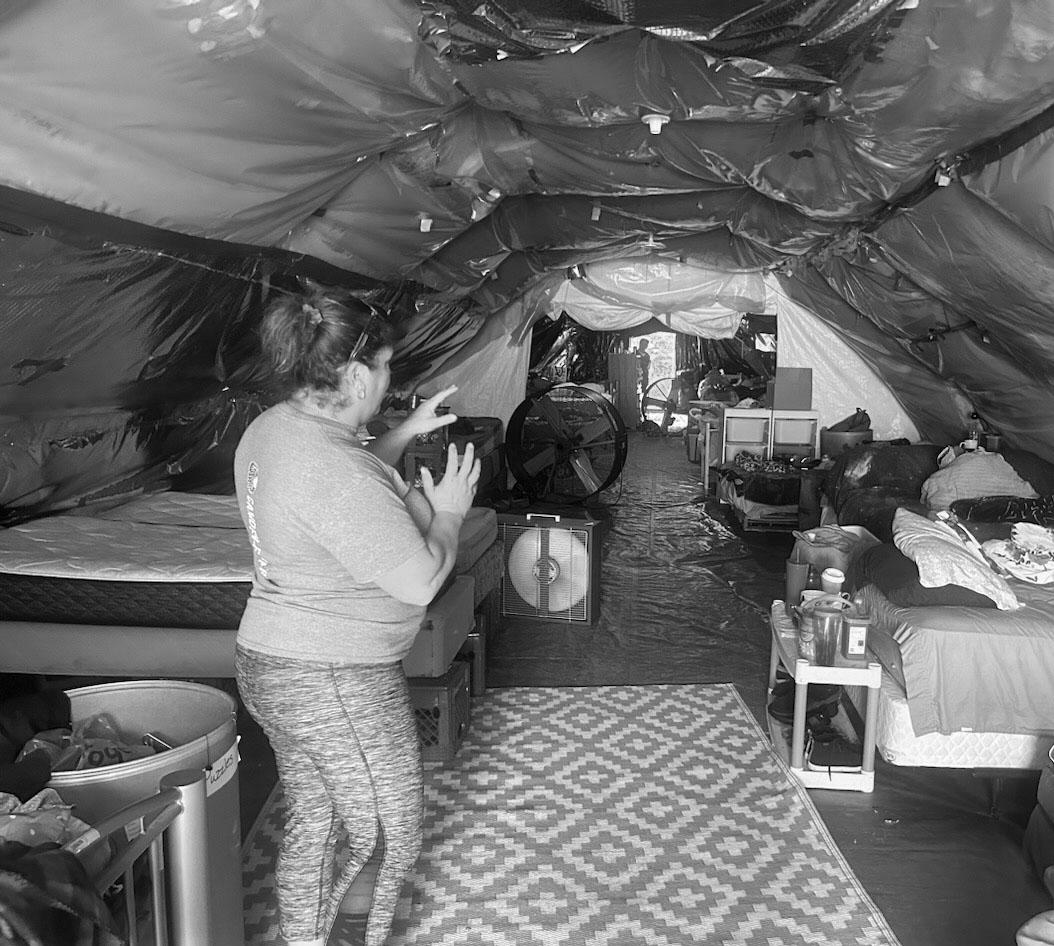
she and her team set up the shelter to provide a safe space for homeless individuals avoiding the dangers of living on the streets or in the woods.
“We started with 17 tents, but the city council came after me because if you have more than four tents, you are considered a campground and those are for recreational use only,” DesJardin said. “Then I ended up buying one big tent, but then the city has been working ever since to get it torn down.”
According to City Assessor Kim Thomas, her main concern is that the tent does not meet zoning regulations, safety requirements, or the legal criteria for a dwelling.
“There have been a lot of interactions between us and them where we have been trying to work with them to come up with a solution that would fit within the
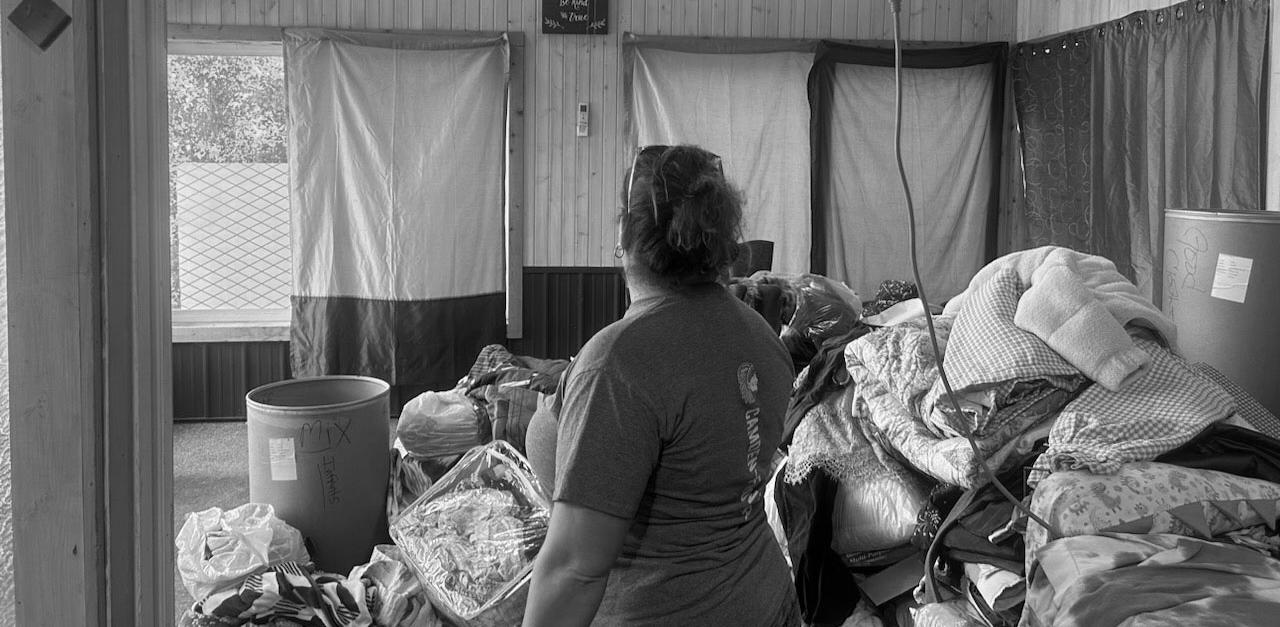
code,” Thomas said. “We recognize that there is a need for housing for unhoused people and commend their organization for wanting to help these people, but the problem is that they didn’t do it legally under the codes for the city or Michigan building code.”
The 14-day deadline comes after DesJardin failed to relocate the shelter’s tenants by April 30 as requested by the Hillsdale City Council. DesJardin said she was issued a municipal civil infraction notice on May
1 for the violation, which later became a District Court ticket.
In response to the city’s concerns, DesJardin said she is trying to convert a storage building behind Hillsdale Community Thrift into a transitional living facility.
Airport to host annual fly-in
By Henry Fliflet
and
14.
Mia Cochran, a tenant at Camp Hope, said the resources the shelter provided for her family were invaluable.
“I have three kids and became homeless in July. I was at my lowest, depressed, and ready to give up on everything,” Cochran said. “After seven weeks here, I found an apartment that I will move into soon with my family. I can say this place saved me and my family.”
“We are working to add bunk beds and create a living space that meets city requirements for a residential facility,” DesJardin said. “We can’t just throw these people back out into the streets, and I don’t know what we will do if we can’t meet the deadline.”
Tennessee bluegrass band performs at Dawn Theater
By David Bellet Collegian Freelancer
Mountain Highway, a bluegrass band from Gatlinburg, Tennessee, performed a selection of bluegrass cov ers Sept. 5 at the Dawn The ater.
The band’s bass player, Joe Glover, called their method of creating music “bluegrassification.”
“We like to take old songs that lots of people haven’t heard in a while or haven’t heard of, and put our own twist on them,” said the band’s mandolin picker and Joe Glover’s daughter, Emily Glover. “But we like to throw in people like Linda Ronstadt and the Eagles just to keep things interesting.”
Victoria Glover, on banjo and Davis Dykes, who plays guitar.
After playing a few traditional bluegrass
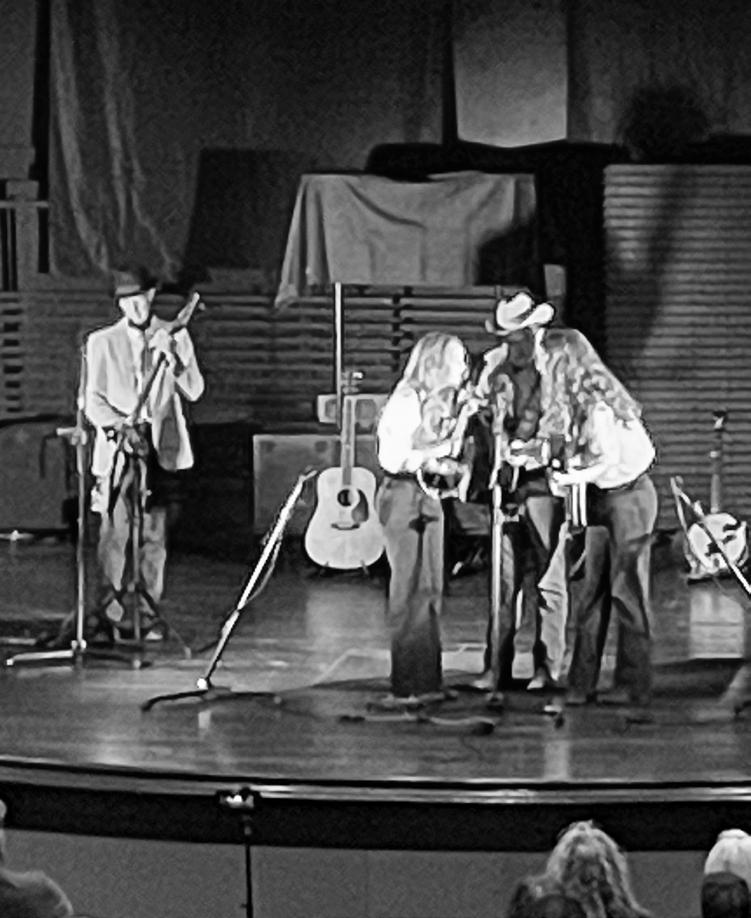
The band also includes Joe Glover’s other daughter,
songs like “Foggy Mountain Breakdown,” Mountain Highway moved to some of their “bluegrassified” songs. Among these were The Eagles’ “Seven Bridges Road” and Dolly Parton’s “Those Memories of You.”
Throughout these songs, Emily Glover and Dykes switched instruments often.
Professor of political economy Gary Wolfram and his wife Mary helped bring Mountain Highway to the Dawn Theater after meeting the band last year, according to Victoria Glover.
“I audited a course, and the course was Economics 101 by Dr. Gary Wolfram, so I’m kind of a fangirl,” Victoria Glover said. “We were performing in upstate New York last year at a bluegrass
festival, and we were walking down to Niagara Falls. He had a Hillsdale College T-shirt on, and we’ve never seen one out in the wild. My dad said, ‘Oh my gosh, Victoria, he’s wearing a Hillsdale
“Bluegrass is the original rock and roll, with all the upside and none of the down.”
shirt,’ and I kind of did a double-take, but I recognized the mustache, and I was like, ‘That’s Gary Wolfram!’ So we met Mary, his wife, and she mentioned that she helps put
on events here at the Dawn Theater.”
After attending the concert, Nathan Schlueter, professor of philosophy, said the event was inspirational and fun.
“Bluegrass is the original rock and roll, with all the upside and none of the down,” Schlueter said.
“It was exciting to see so much young talent, and so many young kids enjoying it. I hope it inspires more people, as Andrew Lytle recommended, to throw out their electronic devices and ‘take down the fiddle from the wall.’”
Emily Glover said she liked playing at the Dawn Theater.
“This crowd is awesome,” Emily Glover said. “We enjoyed it.”
“The event is for the local community — it’s a way to tie citizens into the airport,” said Hillsdale Airport Administrator Travis Stebelton. “We want everyone to feel comfortable at the airport.”
Stebleton said the fly-in tradition, where pilots from the region display their aircraft, has been a fixture at the Hillsdale Airport for more than 40 years.
“These types of events are popular in the aviation community as a way to share local airports with everyone, especially those not directly tied to the industry,” Stebelton said.
Beginning at 7 a.m., the Hillsdale Exchange Club, a local nonprofit, will serve a pancake breakfast, and Chunky Butts BBQ and Grill will serve lunch.
Pilots from local flight school Compass Rose Aviation will take up to three people at a time on airplane rides for $30 per person and helicopter rides for $40. The airport is also hosting a classic car cruise-in during the event, with local police, fire, and emergency response vehicles on display.
Freshman Will Adkison said he is looking forward to the event.
“It’s so great to see something like this out here in rural Michigan,” Adkison said. “It would be awesome to go talk to some people, see some cool planes and cars, maybe get up in the air and take a ride in a helicopter. I’d love that.”
Construction on the new terminal began last year, but the initial design and planning stages were more than 20 years in the making, according to Stebelton.
“I really think people are going to want to see it,” Stebelton said.
Local health agency proposes project to reduce buggy crashes
By Francesca Cella Collegian Reporter
Two vehicle-buggy accidents, causing several injuries and one death, occurred within four days of each other in Michigan last month.
Kris Dewey, of the BranchHillsdale-St. Joseph Community Health Agency, presented a project aimed at reducing buggy crashes to the Hillsdale County Board of Commissioners Sept. 9. The tri-county area is home to 1,100 Amish families, 30% of the state’s Amish population, and the health agency is using a $70,000 federal highway safety grant to improve buggy safety.
While the Michigan State Police and Michigan Department of Transportation attempt to ensure safe buggy transportation in highly Amish-populated areas, Lieutenant Rene Gonzalez, first district public information officer for the MSP, said buggy safety is ultimately the responsibility of vehicle operators.
“A majority of these crashes are the fault of the driver because they’re driving distracted, not paying attention, or driving
too fast, and they misjudge the distance between the buggy and their vehicle, and that’s what’s causing these crashes,” Gonzalez said.
One of the accidents this summer involved a family in the Bloomingdale Amish Community, according to Emmanuel Yoder, a member of the neighboring Centreville Community. He said a daughter in the family needed amputation of both legs after the incident.
Yoder said more vehicle-buggy crashes may be occurring due to the higher concentration of both vehicles and buggies on the roads.
“Twenty-five years ago, our community had six churches with 20 to 25 families,” Yoder said. “Now we have 18 churches. It really has grown, and we could be prone to more accidents because there are more people.”
“MDOT has mitigated Amish buggy safety in several ways,” Jenkins said in an email. “It has done so by installation of wider paved shoulders to allow for a buggy to be completely
or mandating buggy lighting may be beneficial for buggy transportation, it will not solve the issue.
“Those are great ideas, but I don’t think that’s going to allevi-
down to the driver of these motor vehicles needing to pay attention out there.”
Yoder said safe buggy transportation is also the responsibility of buggy operators.
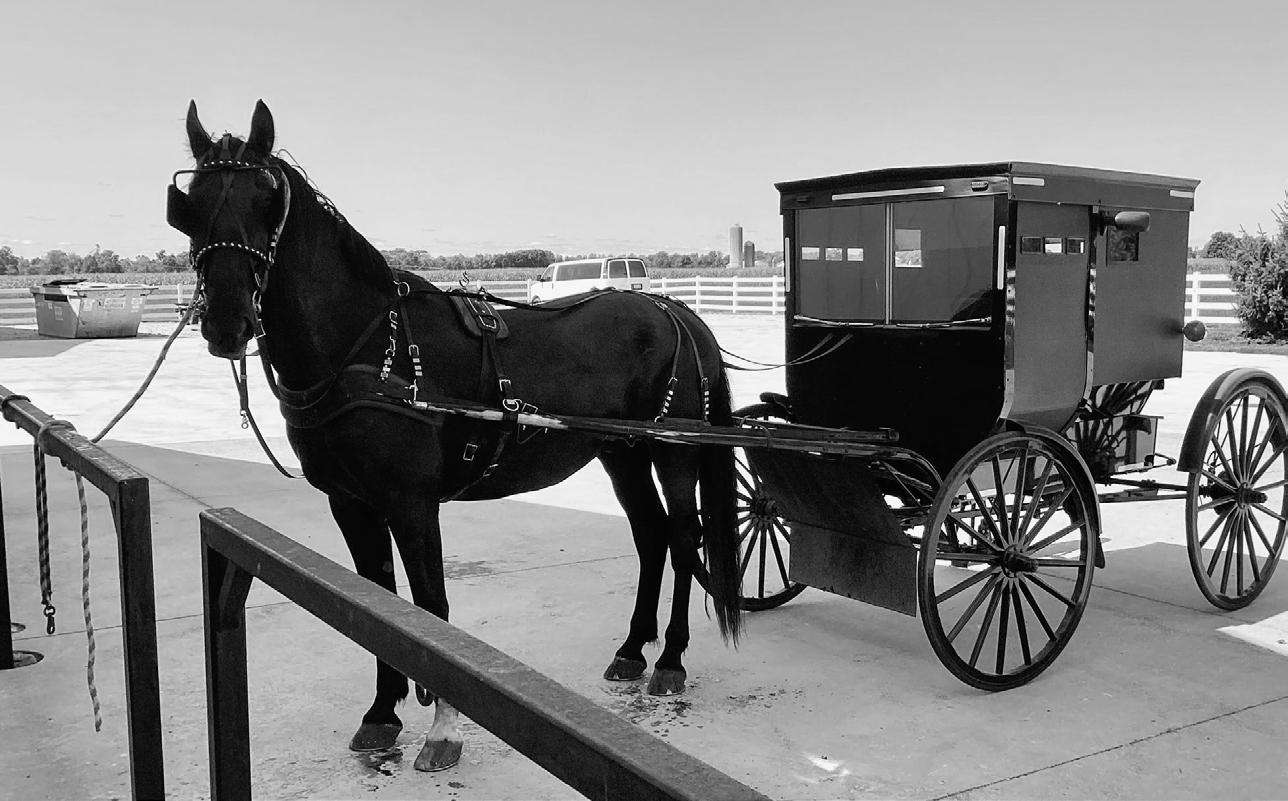
“If we use our respect on the road the way we should, I think that would help a lot,” Yoder said. “I’d say 98% of the people are very respectful to us, and I appreciate that.”
Yoder said buggies should move to the side of the road to accommodate other drivers and protect buggy passengers.
“Some of our people aren’t respectful like I wish they would be,” Yoder said.
“Our district does not have a whole lot of buggies around here, but when I see them, I think they’re doing what they need to do,” Gonzalez said. “They’re keeping to the side of the road, they have signage on the back. They’re allowed to be on the road just like a bicycle or someone walking. It’s the other motor vehicles that really need to watch what’s going on out there.”
The MSP are trying to make the public aware of buggy presence on the roads.
Aaron Jenkins, communications representative for MDOT, said the state agency has adjusted roads to improve buggy transportation safety.
outside of the travel lanes when utilizing the roadway. Also, by the omission of shoulder rumble strips, or relocation of them to directly on the white edge line, to avoid buggy operators having to navigate around them.”
Gonzalez said that although improving shoulder conditions
ate the problem because I think it comes down to distracted drivers,” Gonzalez said. “We get it all the time where we’ve got vehicles parked on the shoulders — police cars, cars that are broken down — and people run right into them, be it that they’re intoxicated or they’re not paying attention. It all comes back
“If it’s not a good buggy lane, you should get off, or if it’s gravel, get off on the dirt. If there’s something coming from either way, I like to get off and respect the traffic because it’s not just for them, it’s for your own safety.”
The Amish generally drive their buggies with caution, according to Gonzalez.
“The only thing we can do is educate, like what we do with seatbelts, with speeding, with construction zones, through social media or even traffic enforcement,” Gonzalez said. “We’ll be out there, and we’ll try to educate the public, or we’ll enforce the motor vehicle code.”
Despite the recent accidents, Yoder said he doesn’t mind riding in a buggy.
“I always just felt about as comfortable in a buggy as in a car, to tell you the truth,” Yoder said.
Mountain Highway performs at the Dawn Theater Sept. 5. David Bellet | Collegian
An Amish buggy in Branch County, Michigan. Courtesy | Rita Hemker
Missy DesJardin shows the inside of Camp Hope. Sydney Green | Collegian
Collegian Reporter
Hillsdale Municipal Airport will unveil its new terminal building with pancakes, airplane rides,
a car show at its annual Patriot’s Day FlyIn Sept.
DesJardin said she hopes to turn Hillsdale Community Thrift’s former storage building into part of the shelter. Sydney Green | Collegian
Civil Air Patrol to receive opioid settlement money
By Elaine Kutas Sports Editor
Hillsdale County will receive more than $2 million from the nationwide opioid settlement that is providing funding to affected states over the next 18 years, with $36,500 approved for the local Civil Air Patrol squadron’s outreach and drug remediation programs, while the Hillsdale County Commissioners are still considering other requests.
Through the opioid settlement efforts, the total estimated funds to be received across Michigan are approximately $1.6 billion. According to Wiley, Hillsdale County will receive more than $2 million in funding over 18 years due to the legal agreements in which pharmaceutical companies owe billions of dollars to U.S. states, trying to create remediation for their help in fueling the opioid crisis.
The commissioners considered two proposals for funding at an Aug. 26 meeting. The request from CAP was approved, while a request from the Coalition for Youth Drug
Prevention was denied.
According to Commissioner Mark Wiley, the commissioners must allocate funds for new projects aimed at drug reduction and opioid remediation. The commissioners approved funding for CAP in a 3-2 vote during the Aug. 26 meeting.
“They presented a plan to go into the schools to recruit students and promote a drug-free program,” Wiley said. “It’s a small group and a small amount of money, but if you can keep one or two kids from drugs, it’s a good investment.”
ing,” Benzing said at the meeting. “If we are going to fund the Civil Air Patrol, then I would certainly encourage all the other local organizations similar to this to apply to the opioid committee as well, but I don’t think that is what this funding is for.”
CAP plans to use the fund-
cal middle school students, wherein they act as ambassadors and role models, guiding students to a basic understanding of the art and science of leadership as well as the dangers of drugs and the detriment that drugs are to lives,” Hambleton said.
“Through Red Ribbon Lead-

Commissioner Brad Benzing said he voted no during the Aug. 26 meeting due to the small size of the organization.
“There are probably a lot of great programs out there, but I’m not sure if funding them is the point of the opioid fund-
ing to advance its Red Ribbon Leadership Academy and to help financially support cadets who otherwise would not be able to afford joining the Civil Air Patrol, according to Grace Hambleton, the Deputy Commander for Cadets and the Drug Reduction Officer for Hillsdale Composite Squadron.
“Our cadets provide a three-hour workshop to lo -
ership Academy, we — senior members and cadets alike — seek to show a better way of life to students — one that is filled with hope and possibilities about which they might not know.”
“We will look at all applications presented to us, and we will be more than happy to present it to the full board of commissioners,” Wiley said. “If we don’t take the op-
portunity on some of these programs, we will still have the money and this same situation in 18 years. Hopefully, we can get some of these programs instituted.” Hambleton said she understands the guidelines for using the funding provided by the county but is confident that their programs will help the youth of Hillsdale County. “We hope to reach as many in the community as possible,” Hambleton said. “As a ‘composite’ squadron, Hillsdale Composite Squadron can accept both cadets and adult members, so we want as many as possible to reap the benefits that CAP can provide.”
According to Wiley, a few other programs have been approved to receive funding from the opioid settlement money.
“Two that come to mind are helping schools fund
counseling or calming corners where a student who is having issues can be supervised and counseled on how to cope with whatever they are facing,” Wiley said. “The other, which is coming to Hillsdale College in October, is called ‘The Elephant in the Room.’ The health department is leading the charge, and that will be targeted toward professionals on how to deal with addiction and drugs in the workplace.”
According to Wiley, new funding cannot be allocated to already established drug rehabilitation or education resources around the county. This has created a challenge for the commissioners to find programs that fit the requirements.
“One of the big things is that Hillsdale has a drug treatment court that we already fund, so we can’t supplant that,” Wiley said. “We can’t use the money we are getting to fund a program we already have in place. We can’t go buy a new snow plow, either.”
Paladino’s plan to remove fluoride from water stalls
By Eleanor DeGoffau Collegian reporter
Fluoride remains in the city’s water, months after Acting Mayor Joshua Paladino ’18 said removing it was his top priority.
“I asked the city manager to research it and bring forward a resolution, to at least give the city council an opportunity to vote on whether we should continue to fluoridate the public water supply,” Paladino said. “But nothing has come of it yet.”
Paladino said he is debating with the city council on whether removing fluoride from the water is legally possible.
“I don’t think there’s any sort of legal prohibition on us doing it. It’s just that the city staff hasn’t acted,” Paladino said. “They’re just sort of saying, ‘Well, we don’t know if we can do that. We don’t know what the ramifications are.’ But as far as I’ve found, it’s totally up to the municipality. There’s no state or federal requirement to fluoridate the water.”
David Mackie, Hillsdale’s city manager, said in an email that he currently has no plans to bring forward a resolution and will not do so until notified by the council.
“There has been no further discussion of this matter at city council, nor has council directed staff to pursue any action,” Mackie said. “Because fluoridation is a public health issue, staff would not make any changes, under any circumstances, without explicit direction from the council.”
Mackie said the council-manager form of government in the city charter does not allow him to take direction from individual members of the council like Paladino.
Gary Wolfram, Ward 3 councilman and professor of economics and public policy at Hillsdale College, said in an email that the city council has yet to have the issue of fluoride in water on its agenda.
“The idea of removing fluoride from the city’s water has not been discussed by the city council as far as I know,” Wolfram said.
Mackie said the act of removing fluoride from the city’s water would require significant upfront adjustments to the water system and management but could potentially save the city money in the long term.
“These include modifying how the water is treated, removing or reconfiguring equipment currently used to feed fluoride, updating monitoring and reporting protocols, and providing additional staff training,” Mackie said. “At present, the city does not have a water or wastewater superintendent, and given that vacancy alongside the workload already being managed by existing staff,
this is something that, while technically feasible, should be planned well in advance of implementation.”
“I don’t think there’s any sort of legal prohibition on us doing it. It’s just that the city staff hasn’t acted.”
According to the Centers for Disease Control and Prevention, fluoride in drinking water reduces cavities by more than 25% in children and adults. Paladino is among the government officials pushing back against this recommendation, such as Health and Human Services Secretary Robert F. Kennedy Jr., who said he planned to tell the CDC to stop recommending fluoridated water.
A study published earlier this year found evidence that fluoride levels higher than 1.5 milligrams per liter
can reduce IQ scores in children, but the evidence was not conclusive enough to find harmful effects at less than 1.5 milligrams per liter. The level recommended by the CDC is 0.7 milligrams per liter.
According to the 2024 water quality report completed by Hillsdale’s Board of Public Utilities, Hillsdale’s city water currently contains 0.62 parts per million of fluoride, lower than the CDC-recommended level.
Paladino said fluoride is no longer needed in city water in the 21st century.
“There’s so many available resources to titrate your own fluoride usage if you so desire, mouthwash, toothpaste, you can even add it to your own drinking water, so there’s no reason to have this mass fluoridation,” Paladino said. “But also, there’s evidence now that the levels used are not safe for a whole population. You’re using a standard amount that might not be safe for babies or children or pregnant women or very old, even if it is safe for the average healthy mem-
ber of the population.” Paladino said if no more action is taken toward the issue, he will bring it to a vote before the end of his term.
“I think basically the situation is that the city staff doesn’t care or doesn’t want to do this, and so it’s probably not going to get done,” Paladino said. “The problem is that if I bring forward the resolution, it’s almost certain to get voted down by the council, because every time I try to do something on my own initiative, they say that I’m going out of the standard order procedure, and usually reject it. If it doesn’t get done before November, I’ll at least bring it forward for a vote, and if that fails, it’s OK.”
Wolfram said if the issue was brought up in the city council, he would likely oppose it.
“I am certainly not an expert on the issue and do not have a strong opinion. However, I believe the benefits of fluoride in the water outweigh the costs,” Wolfram said.
Animal neglect leads to growing homeless cat population
By Megan Li Features Editor
When Kátia Sherman bought her house after accepting a job at Hillsdale College eight years ago, she found an enormous colony of stray cats roaming around.
“In one summer, a colony of 20 can turn into a colony of 130, so I neutered and spayed all of them and provided outdoor housing, food, and stuff for them,” said Sherman, an associate professor of Spanish. “A lot of them became so friendly that I was like, ‘I need to start adopting these things.’” When Sherman ran out of space in her home in 2020, she dug into her retirement account to build the Feline and Friends Shelter. But, according to Sherman, there were so many stray cats coming in that she ran out of funding. She surrendered her license as an animal shelter a year ago, stopped taking animals outside of extreme circumstances, and deleted the shelter’s internet presence. Now, Sherman said although the shelter is no longer an of-
ficial and working institution the cats continue to come.
“I blame it on my own inexperience — big heart, but not a lot of know-how,” Sherman said. “I took in a lot of cats that were not adoptable cats.”
Sherman said every stray cat who came to the shelter was brought to her by students, neighbors, and strangers who heard about her shelter through word of mouth.
“The population of cats, outdoor cats, feral cats, proliferates as fast as you or I can count, and sometimes you have an outbreak of disease out on the streets,” Sherman said. “It’s a very difficult place to try to do this, because the need is so great, the willingness is so small, and it’s all about money.”
The shelter took in between one and five cats a week, and kittens were likely to leave the shelter fastest, according to Sherman. Other cats were not.
“If you have a black cat that is an adult and has a special need, like Molly, who is absolutely the most loving cat we have in the shelter, people just won’t adopt them,” Sher-
man said. “Once you begin to observe them, you see how tremendously hard their lives are.”
Senior Emma Wiermann had volunteered at Feline and Friends since the first semester of her freshman year.
“We’re giving them pets and affection and teaching them to be socialized to humans,” Wiermann said. “But I’d say it’s cool that they’re doing me a service because they’re giving me the furry anxiety repressives that I need — a good way to cope with the busyness of school.”
Sherman said she sees more stray cats in Hillsdale than she has seen anywhere else.
“I grew up in the dumps,” Sherman said. “I’ve never seen anything like this.”
Sherman said it is the instinct of cats to reproduce, and the city does not have the funds to counter that with a public spay clinic.
“It needs fundraising, and then it needs controlled publicity,” Sherman said. “When I retire, that’s what I’m going to do if I stay in Hillsdale, because the need is obvious. It
screams at you.”
Director of the Great Hillsdale Humane Society Megan Gordon said the Humane Society hosts a spay and neuter clinic about once a month, born from a program called Fix the Future in collaboration with the BISSELL Pet Foundation.
“We can normally take around 20 to 30 cats and there they get fixed, microchipped, basic vaccines, and it is $25,” Gordon said.
Sergeant John Gates, who heads the Hillsdale County Sheriff’s Office Animal Control Division, said the division handles dogs and livestock, not cats.
“The biggest thing is that cats are considered fe ral animals, and there is a lack of resources,” Gates said. Sherman said there are people in the county trapping and killing cats.
on every corner. But I get frustrated sometimes because I feel that Christian teaching of caring for your neighbor doesn’t extend to the next species.”
Gates said education and responsible pet ownership
not be surprised.
“Absolutely, our office will enforce it,” Gates said. “It’s a violation of state law.” Wiermann said the community can push for changes in laws concerning animal cruelty.
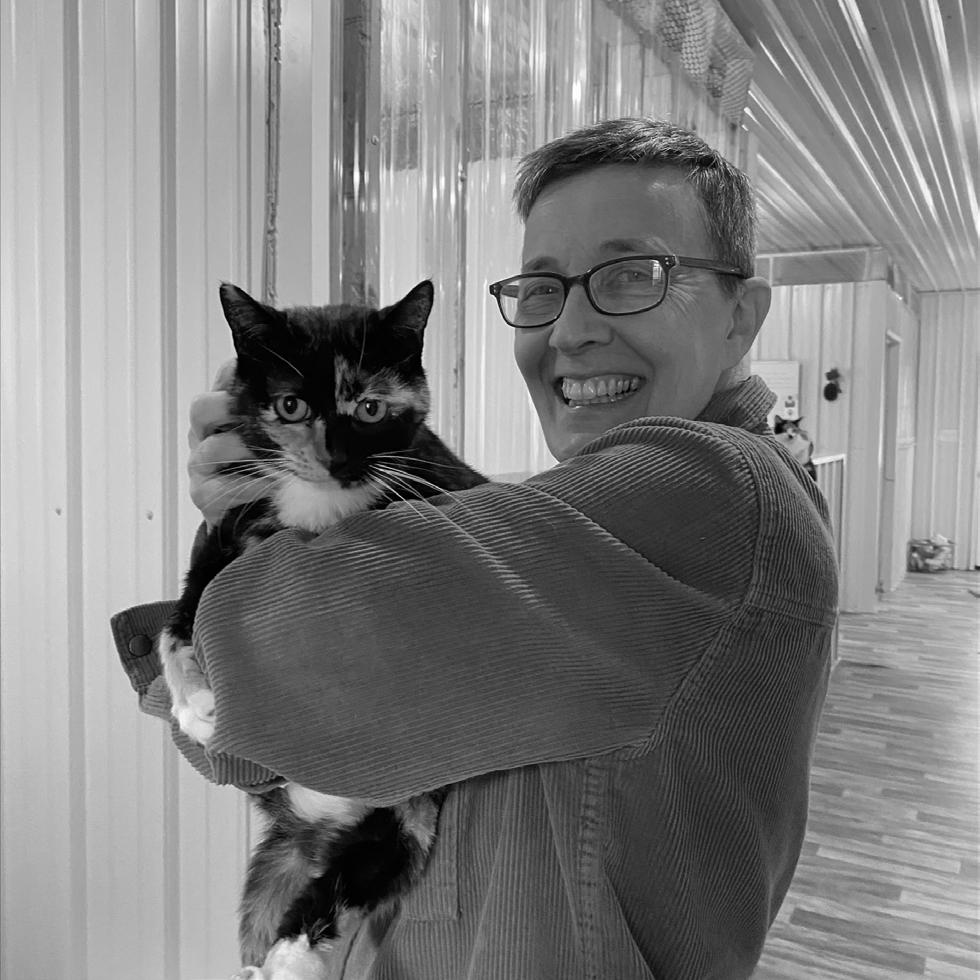
“As the intelligent species, we owe them better,” Sherman said. “This is a very religious little town. There is a church
can provide the most help in alleviating the problem. He has not heard specific cases of animal cruelty, but he would
“Obviously, don’t be a terrible person,” Wiermann said. “They’re God’s creations, just like we are — obviously not the same, but still worthy of love and respect.” Sherman said cat owners should try to care for or, at least, spay a cat before deciding to give up on it. “Don’t buy that new pair of jeans that month and get the cat spayed,” Sherman said. “It’s little things that we can do, little sacrifices that we can make on our end that will change the life of another being that shares this planet, in this life with us. It’s edifying, it’s gratifying. It will make you feel better.”
Kátia Sherman holds Luna, a rescued cat. Megan Li | Collegian
Sports
Cross Country
Men and women finish runners-up at home opener
By Anna Stirton Collegian Reporter
The men’s and women’s cross country teams both placed second overall at the season’s first meet at Hayden Park Sept. 5.
Sophomore Ally Kuzma and senior Gabe Phillips both took first place individually in their respective races. On Sept. 8, Kuzma was subsequently announced as the Great Midwest Athletic Conference Women’s Cross Country Athlete of the Week.
“The first taste of competition is always intriguing,” head coach R.P. White said. “It’s always exciting to kick things off on our course and to be out in front of the home crowd. This experience let us identi-
fy where we could be better and then also highlighted our strengths.”
On the men’s side, junior Gabe Phillips took first place in a 5-mile race, finishing in 20:10.03. Second for the Chargers was junior Caleb Youngstedt, placing ninth overall in 21:13.7. Freshman John Richardson executed his first collegiate debut, finishing 10th in 21:20.9. The final two scoring runners were sophomore Zach Self, who took 11th in 21:24.4, and senior Nathaniel Osborne with a 13th place finish in 21:25.9.
“It was more of a controlled atmosphere where coach gave us paces to hit, and we had to hit those paces, and then we could really race the last bit,” Philips said. “It’s a challenging
course, and I think the team handled that well.”
On the women’s side, sophomore Kuzma took first place in the 5k race with a time of 18:20.3, and beat the runner-up by 50 seconds, and according to White, achieved the strategy they hoped.
“We had a race plan going into the start that was a little conservative, and then just kind of seeing how I felt from there, and I felt pretty good,” Kuzma said. “It was a lot of fun to start racing again.”
Behind Kuzma, junior Savannah Fraley came in second for the Chargers finishing in eighth place with 19:53.8, immediately followed by junior Eleanor Clark coming in at 19:54.9. Two freshmen rounded out the scoring run-






ners with Grace Tykocki placing 16th in 20:23.0 and Caroline Roberts placing 19th in 20:47.9.
“Obviously we are all driven,but we’re all driven together,” Kuzma said.
Following this home opener, the Chargers plan to enter a slightly different scene at the upcoming Michigan State University Spartan Invitational in East Lansing Sept. 12.
“The idea is to put ourselves in a hyper-competitive environment at a really large stage,” White said. “That experience will be something that will help us during championship season.”

By Sophie Ortiz Collegian Freelancer
When the Hillsdale College women’s club soccer team takes on Michigan State University Sept. 12, it will launch their season. With 28 players, the club will compete with the largest team they have seen yet.
“This year, compared to other years, we’ve had the most women ever come out,” senior and club president Madison Gilbert said.
Gilbert said the new players already have good attitudes, want to learn, and are hardworking.
The club will compete in five away games and four home games with their new coach, Sarah Walworth. Walworth is a Hillsdale native who teaches art education at Hillsdale High School.
“I think we were really blessed to find Sarah,” Gilbert said.
“She knows what she’s doing, she loves soccer, she’s played most of her life. I think she’s going to be fantastic.”
Walworth also currently coaches the Hillsdale High School girl’s varsity soccer team which she was once a part of.
“As a fellow woman, I think she will be really inspirational
and will definitely push our team to grow,” sophomore and midfielder Lizzy Schueckler said.
Walworth also shares that she is greatly looking forward to joining the team culture and growing their capacity on the field.
“I am excited to be a part of the team culture these women are creating and I can’t wait to collaborate in the game of soccer with them,” Walworth said.
This will be the club’s second year in the Women’s Midwest Alliance Soccer Conference within the Great Lakes region and affiliated with NIRSA: Leaders in Collegiate Recreation region III.
According to Gilbert, the club switched to the WMASC league because they found more common ground where they could play teams that were better suited for their level.
Last year, the team entered the league with the goal to win at least one game, but with a senior class that has been playing together for a while, the team is aiming for an even greater season.
As a club sport, team members contribute most of the club’s finances.
“The college was nice enough to increase their fund-
Women's Tennis
ing,” Gilbert said. “However, the silent auction is one of our main fundraisers, and we make around two grand with the help of professors, faculty, and the community.”
As Schueckler explained, these auctions are held every spring, and the team looks forward to hosting one under its new leadership later in the year.
“These auctions are a really nice way for the community to participate in our team’s growth,” Schueckler said. This level of student initiative and self governance is what characterizes the club teams.
“It’s totally student-run,” Gilbert said. “If we didn’t reach out, plan, and schedule the games, it wouldn’t happen.”
Additionally, the players themselves said they love the club’s community.
“The soccer team was my first group of friends,” Schueckler said. “Also, I didn’t have to meet any men for like three months, which was really nice in freshman year.”
The club continues to provide the women with more than just soccer skills. The club will have five away games and four home games.
Chargers dominate at home
By Sophia Douglass Collegian Freelancer
The women’s tennis team competed at the Chargers’ Summer Invitational Sept. 6-7 where each Charger secured at least one match win.
Freshmen Dimitra Papastavrou, Sydney Singh, and Esther Sura joined the Chargers for the 2025-26 season. All three players competed in three singles matches and three doubles matches at the invite.
The Chargers’ singles teams had a strong showing in the tournament, with junior Ané Dannhauser beating Paola Herrera Rivera of Lawrence Tech University 6-2, 6-0 and Yadi Mara of Ferris State University 6-1, 6-4, before losing in the A bracket finals match. Dannhauser placed second overall in the A bracket.
Sophomore Briana Rees won her opening round match in the A bracket, defeating Claudia Calabuig of Lawrence Tech 6-2, 6-3.
Papastavrou placed second in the B bracket, having defeated Rocio Lopez Alcerro from Lawrence Tech 6-1, 6-1, and Anastasia Diamantopoulos of SVSU 6-2, 1-6, 10-5.
All Chargers in the C and D singles brackets secured a victory in their opening round matches as well.
The invitational also saw the success of many Chargers doubles teams.
Dannhauser and Rees won two of their three matches and placed third overall in the A bracket for the invitational, while sophomore Julia Zlateva and Sura earned runner-up honors in the B bracket.
Dannhauser said despite the quick turnaround, she considered the invitational a great experience and was excited for the next competition.
“I look forward to continuously improving and starting stronger,” Dannhauser said.
Although the team was successful, head coach Mel -
anie Zampardo said she intends to use this competition as a learning experience.
“I was super pleased but, as always, there certainly is stuff to work on,” Zampardo said. The 2025-26 season is the first one with Zampardo as head coach of women’s tennis, and she said she is excited to see where the season will take her and the team.
Rees said she is thankful for the many practices before their next competition and intends to use that time to learn from her mistakes.
“Because we have a lot of practices before our next invitational, we should do better than this past weekend,” Rees said. “Yes, we are nervous, but we are also excited to see how it goes.”
The Chargers will compete at the Charger Fall Invitational Sept. 19-20 at home.
Ally Kuzma leads the women's race. Courtesy | Sarah Chappelle
Action Shooting
Season opener sees podium finishes
By Daniel Johnson Collegian Reporter
The Hillsdale College action shooting team opened its 2025 season at home with three podium finishes Sept. 6.
The team competed in a United States Practical Shooting Association match at the Ailes Action Shooting Range in the limited and limited optics categories.
“Overall, I was proud of how the team did, especially our new members,” junior and team captain John Beecher said.
The Hillsdale team split into the limited and limited optics categories, based on the features of their guns, and had athletes in the top five places of both categories.
Beecher won third in the limited optics category. Seniors Joseph Grohs and Jonah Kirstein came in right behind him in fourth and fifth, respectively.
According to Beecher, the team was encouraged by these results but saw room to improve.
“I think we all felt like we left something out there,” Beecher said. “But there was a lot to be positive about.”
Juniors Kayla Mullin and Jianna Coppola took first and second in the limited category for both men and women, nearly sweeping the podium for the Chargers.
“I’m really happy with how I performed in this match,” Coppola said. “I felt that I got into a good rhythm early on and executed each stage according to my stage plan despite having setbacks right before I shot on two of the stages.”
According to Coppola, the match showcased the team’s adaptability and preparedness.
“This was our first match and some of the stages in the match included elements that we hadn’t seen in a while,” Coppola said. “For example, one of
the stages required us to shoot over 25 yards at smaller targets. This is no easy task for those of us who were shooting iron sites in the limited division.”
According to Kirstein, action shooting, which involves squads of athletes shooting targets of various sizes and distances in several stages as quickly and as accurately as possible, is an intensely mental sport.
“We really emphasize confidence and mental fortitude, because it’s a mental sport,” Kirstein said. “You’re out there for six to 10 hours, and your mind is just running the entire time. You have to be on it the entire time.”
According to Kirstein, the match allowed the team to demonstrate this mental resilience.
“Every match has its highs and lows,” Kirstein said. “But we’ve trained enough mental discipline so that if we make a mistake or have a bad stage, we can have our best stage after that.”
According to Beecher, the team is building up for the collegiate match that will be hosted at the Ailes Action Shooting Range in Hillsdale this fall.
“The match we’re building up to is coming up really soon, the collegiate match, when we play schools like Texas A&M, Virginia Tech, and the Naval Academy,” Beecher said.
The Hillsdale College and Springfield Armory Collegiate Championship, which is scheduled for Sept. 20-21 at the Ailes Action Shooting Center, is where Hillsdale Action Shooting won its national title last year.
According to Kirstein, the team’s goal is to carry on this legacy.
“We’ll be competing against Navy and Texas A&M, those are probably our two biggest competitors,” Kirstein said. “Our goal is to just knock their socks off.”
Emma Palus: Poland to Hillsdale
By Anna Northcutt Collegian Freelancer
When sophomore Emma Palus came from Poland to Texas for her senior year of high school, she was already planning to go to college on a tennis scholarship. She did not, however, originally want to attend Hillsdale.
Palus’ parents signed her up for tennis when she was 6, but it wasn’t until she was 12 that she began taking the sport seriously.
“It wasn’t even a passion,” Palus said. “It was just my life, like it became my life — tournaments, practices every day.”
Her parents also signed her up for English language classes in addition to her regular schooling, encouraging her to visit the U.S. one day.
When Palus’ father learned she could fund her college education with tennis, the sport gained a new importance for both of them.
“It just seemed like a really fun way to use tennis to also support the academic side I really wanted to pursue,” Palus said. “Going to college on a tennis scholarship was my goal since I was probably 15.”
For her senior year of high school, Palus transferred to John Newcombe Tennis Academy in Texas. At the academy, Palus discovered, among other things, the difficulty of trying to understand English when spoken with a strong Southern accent.
“Forming sentences took me so much time,” Palus said, “But eventually I just got used to it, and now I think it's only getting better.”
At the academy, she would practice tennis from 6 a.m. to 4 p.m., working in her schoolwork afterward, which she did remotely through her school in Poland.
Although growing up she had attended a hybrid school where she would take exams in person but do her studying at home, going completely long-distance posed new challenges. For example, her teachers could no longer proctor her
exams in-person, and monitoring them virtually required her and her teachers to work around the seven-hour time difference.
After finishing high school,
“They had high acceptance rate and low graduation rate,” Palus said. “They were more focused on the sports. Which, I still love tennis, but there was a


Palus attended a Division I school, Lamar University, in Texas for a year. Although she chose the school because she loved Texas and had made many friends there, she ended up becoming disenchanted with it.
Charger Chatter
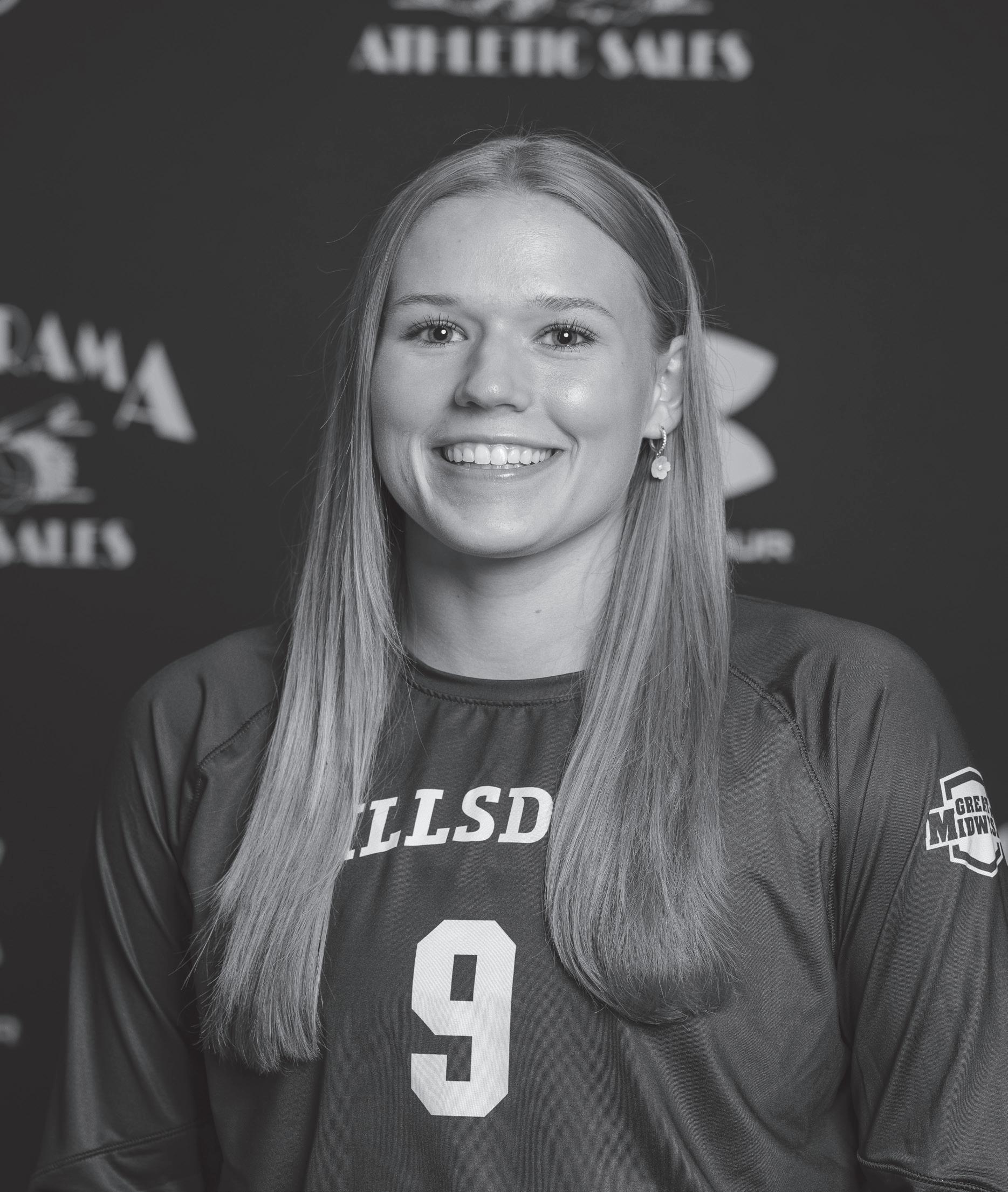
Adi Sysum, Volleyball
Compiled by Malia Thibado
dale, they’re really tough, but at the same time, they’re so much better. They’re so much more interesting. And you can actually tell that the professor really cares about you and about your studying.”
Although Palus had never visited Hillsdale, her father was familiar with the school because of its conservative politics and had always wanted Palus to go there.
“He also is a fan of Charlie Kirk,” Palus said. “He was also talking a lot about this school. To be honest, I should have trusted him and go my first year here. But I’m just glad I ended up here.”
Meanwhile, Palus has made a favorable impression on both her coach and her teammates.
“Emma is hilarious, I love her,” head coach Melanie Zampardo said. “She’s willing to try new things and push herself, and that's something that I’m super excited for. I think that she’s going to be able to show a lot of growth with that type of mindset.”
Senior and team captain Bella Spinazze said after just one week of getting to know Palus, she already views her as an amazing addition to the team.
“Emma is so fun and just a light on court,” Spinazze said, “She’s always cheering and always has a smile on her face. She’s already such a fun presence and brings an amazing vibe to our team.”
After college, Palus said she wants to pursue a career in corporate law, but she still plans to play tennis for fun and encourages others to do the same.
lot of pressure on that side.”
By contrast, Emma said she was disappointed at the school’s lack of academic rigor.
“To be honest, the classes at my previous college weren’t that hard,” Palus said. “Here in Hills-
What's your go to party trick? Spinning a ball on my finger.
What's a life lesson you learned from a non-serious source (movie, TV show, book, music)?
I learned from “The Office” that work life can actually be enjoyable when you make the most of it.
“Just sign up for private lessons, or even just pick up some random racket, a ball, get a court with your friend that also doesn't know what to do, and just try to hit the ball on the other side,” Palus said. “Obviously, you have to put many, many hours into tennis to actually be satisfied with the way you hit the ball. But to be honest, it's so much fun. I think anyone could start.”
If you had to be any food topping, what would you be and why?
A tomato because my face gets really red when coach makes us run sprints.
If you had to play another sport, what would it be and why?
Spikeball because I can play it on the beach.
If you had to choose a roomsized space to live in for the rest of your life, where would you choose?
A pantry.
Above: Palus plays tennis in high school
Below: Palus poses at a Christmas celebration Courtesy | Emma Palus
Charger Sports

Football
Chargers open 2025 season with a road win
By Christian Papillon
Assistant Editor
The Hillsdale College football team opened its season on the road with a 22-17 win against the McKendree University Bearcats Sept. 6. Sophomore quarterback Colin McKernan had a career-high 255 passing yards, three touchdowns on 17 of 32 passing, and added 50 rushing yards, also a career high.
“The pass game felt great,” McKernan said. “I’m definitely feeling comfortable behind the O-line and with my receivers.”
The Chargers jumped out to a 14-0 lead entering the second half. They then allowed McKendree to score 17 unanswered points, leaving the Chargers with a 17-14 deficit on their own 19-yard line with 2:06 on the clock.
After converting a 4th and 10 pass a few plays earlier, McKernan uncorked a game-winning 50-yard touchdown pass to sophomore receiver Tutt Carrico with 1:09 left on the clock. McKendree drove the ball all the way to the Chargers’ 12-
yard line before an interception by junior defensive back Ryan Niska iced the game.
The Hillsdale defense held the Bearcats to 54 rushing yards and the offense controlled the ball for 38:20 of game time as opposed to 21:40 for the Bearcats.
“Our defense did a great job controlling McKendree’s running game, which allowed us to have a huge advantage in the time of possession,” head coach Nate Shreffler said. “They also did a great job minimizing the number of big
plays McKendree was able to generate and created a couple of huge, timely turnovers. Offensively, we took pretty good care of the football and made some really big plays when we needed them.”
Shreffler also praised McKernan’s performance.
“Colin has a firm understanding of what we are trying to do, he is reading the defense well, getting the ball where it needs to go, and he is also making plays with his feet,” Shreffler said. “He is much more comfortable than
Hillsdale endures loss in Florida
By Grace Brennan Assistant Editor
The Hillsdale Charger volleyball team lost against the Florida Southern College Moccasins Sept. 6, winning the first two sets and losing the last three, making them 1-2 overall.
Hillsdale had a strong start in the first set, with a 5-0 run, including two kills from sophomore Caroline Lanicek and an ace from redshirt junior Emory Braswell, to secure a 25-19 victory.
Sophomore outside hitter Ellie Fles said the team’s defense was good in the first set, blocking balls from coming over the net and using its middle players to expose the Mocs weaknesses.
The second set was tight with neither team holding a lead of more than three points. Trailing at 22-21, Hillsdale scored the last four points, taking a 25-22 victory.
Braswell said she was proud of the way she played in the first two sets.
“I did my best to swing fearlessly every single time,” Braswell said.
Braswell also said the first two sets were won because of their excitement and level of trust in one another.
“We were fired up in the first two sets,” Braswell said. “We had high energy but an
both teams to even.
Hillsdale started the fifth set with a 7-3 lead, but the Mocs hit back with a 6-0 run leaving the Chargers with no time to respond. The Chargers lost the game 3-2.
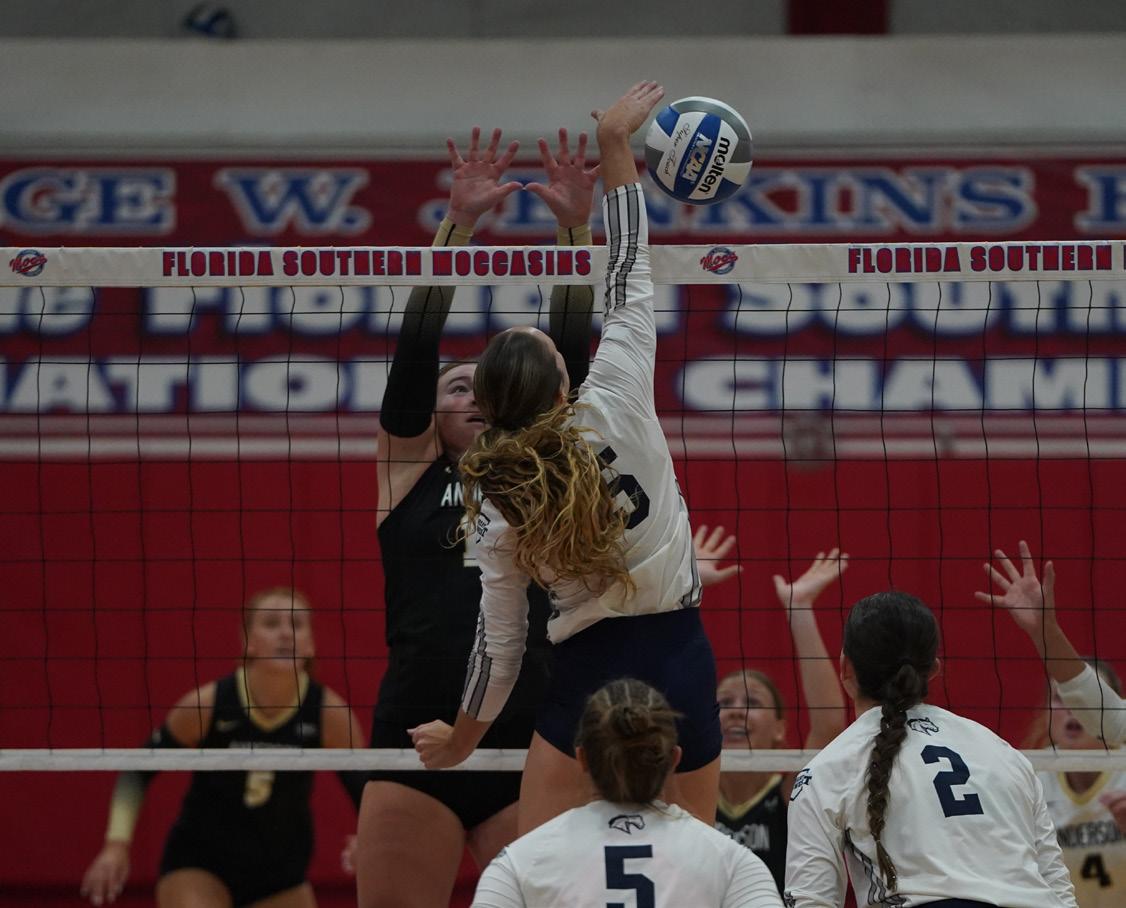
even, calm level of play. Every player on the court trusted that the person next to them would take care of the ball, and that’s what we did.”
Hillsdale was one set away from victory, but the Mocs came back stronger in the third and fourth sets, bringing
Head coach Chris Gravel
said the Chargers lost their energy in the last two sets and were unable to recover. To improve, Gravel said the team will work on consistency in both skill and mindset.
“Our ability to control the ball and recover after errors
diminished,” Gravel said. “We appeared to be a little tired at the end of our last two matches. I think a little extra physical and mental conditioning could do us some good.”
According to Fles, the Chargers are going to practice harder this week, with intentional focus on consistency and confidence.
“This week we are going back to practice with fire,” Fles said. “Every game is unique so we need to focus on what we can control, which is our discipline and consistency. To win the next game we need to play confident in ourselves and in each other, and that will continue to develop as we practice hard together.”
Hillsdale travels to Grand Valley State next weekend for three matches in the Hampton Inn and Suites Grand Rapids Downtown Classic, starting with matches Friday, Sept. 12, against Wheeling University at 10 a.m. and University of Central Missouri at 4 p.m. The Chargers will play Grand Valley State University at 3 p.m. Saturday, Sept. 13.
he was a year ago and he will keep getting better with more and more experience.”
Sophomore wide receiver Andrew Konieczny led the team in receiving with 106 yards on seven catches.
“It feels great being back in action,” Konieczny said.
“All the hard work we’ve been putting in since the offseason and seeing it pay off is a great feeling.”
Konieczny said the team is looking forward to building off its momentum.
“The energy in the locker
Golf
room is great,” Konieczny said.
“It was a great team win on the road and gives us momentum going into our game against Michigan Tech.”
The Chargers will next face the Michigan Technological University Huskies at their first home game Sept. 13, with kickoff at 1 p.m.
“We’re always confident we can beat anyone in the nation,” McKernan said. “We have that same confidence no matter who we face, and we push to get better every day no matter how we play."
Chargers claim Glenmoor title
By Ameera Wilson Collegian Reporter
The Hillsdale men’s golf team started off their season with a victory at the Malone-Glenmoor Invitational Sept. 8-9, winning its first team title since 2023.
Junior Rob Thompson, who shot 73-67-68 to finish with an eight-under 208 and win by four strokes, led the group to success with his first individual tournament win.
“I felt good coming into this tournament,” Thompson said. “The scores were pretty good overall as a team during qualifying, better than in years past. I also like the course we played this week.”
“Rob played great,” senior Max Burns said. “He has been due for a win and everyone is excited he got it done this week because we all know how good he is.”
Head coach Luke Kelly said he expects more success as well as more hard work going forward in the season.
no changes in those expectations moving forward. We are always striving for more, either getting better or getting worse, never staying the same. The sky is the limit for this team.”
Junior Oliver Marshall was another strong competitor in the tournament, coming off of an injury from last season to shoot a 77-69-75 and tying for 11th place. Marshall said the team has a deeper lineup than in former seasons which hopefully will contribute to a successful season.
“Going forward I think we could be really good this year,” Marshall said. “We are much deeper than we have been in past years. Every guy in our lineup contributed to the win, which hasn’t been the case in the past.”
“We won the first event of the year, always nice to start on top.”
Sophomore Jackson Piacesek, freshman John Cassidy, Burns, and junior Ryan O’Rourke also had strong showings, placing 17th, 25th, 28th, and 29th.
By Nathan Furness Collegian Freelancer
first NFL reception, and, most memorably, his first NFL touchdown.
“TeSlaa’s catch was amazing,” Athletic Director John Tharp said. “It demonstrates his elite talent level, hands, body awareness, and concentration.
We are proud of Isaac and the man that he is.” The celebration came as the Detroit Lions dropped their season opener 27-13 to the Green Bay Packers at Lambeau Field Sept. 7. But even in defeat, TeSlaa contributed a highlight that gave Lions fans something to cheer about. With just under four minutes left in the fourth quarter, TeSlaa hauled in his first career NFL touchdown.
just beyond the outstretched hands of Packers defensive back Carrington Valentine. TeSlaa, adjusting mid-air, reached back with one hand and somehow secured the catch in the back of the end zone, barely getting his two feet in bounds.
After scoring 6 points in the first three quarters, the Lions' offense put a drive together, but were facing a 4th and 3 at the Packers' 13-yard line. Quarterback Jared Goff placed the ball
TeSlaa’s catch took the internet by storm. It racked up millions of views across social media platforms. But for his old teammates, it was nothing new.
“Isaac’s been making plays like that since day one,” said former Hillsdale teammate
Dravyn Spies ’25. “We always expected it, so seeing it on the NFL stage just feels like the rest of the world finally caught up. He’s built for moments like that.”
Junior wide receiver Shea Ruddy echoed that sentiment.
“I watched it live on TV and I was genuinely blown away,” Ruddy said. “It’s pretty cool to think that guys on the team played with him. It just shows you that talent can come from Hillsdale.”
“We won the first event of the year, always nice to start on top,” Kelly said. “But this was not even near the best of our abilities and there is a lot to improve on. Lots of work to do in the upcoming week to improve and get ready for our next event.” Kelly said the win was not a surprise but just a starting point for the team.
“My expectations were high coming into the season,” Kelly said. “This is what we expected to happen, so
Kelly said that the team as a whole is set up for more achievements as the season goes on.
“I think the guys are maturing and growing both as golfers and as people, which will set them up for great success this year,” Kelly said. The team will play at the UIndy Fall Invite Sept. 22 at the Broadmoor Golf Club in Indianapolis, Indiana.
A10 September 11, 2025
The football team
Senior Josie TeSlaa spikes against the Mocs on the road.
Courtesy | Florida Southern College

Culture
Visiting artist brings rustic America to life on canvas
By Lucy Billings COLLEGIAN FREELANCER
A young man on horseback, pistol in hand, flees several wild wolves through the snow in “Closing In,” the painting that greets you when you step into the Daughtry Art Gallery. The vivid expressions and cool blue tones make the painting brisk and dynamic.
The piece opens an extensive exhibition of professional painter Albin Veselka’s work, which will be on display in the gallery Sept. 5–Oct. 12. Most of his work is oil on linen, but the collection contains a range of scenes and styles including abstract art, head studies, still life, Western scenes, and a handful of charcoal portraits. Born in Wyoming and raised in Idaho, Veselka paints full time and has taught painting at Brigham Young University in Idaho. He has received numerous awards for his work and was most recently accepted into the Cowboy Artists of America in 2023.
When an art student interviewed Veselka for a senior portfolio course, Visiting As -
sistant Professor of Art Roxanne Kaufman was impressed with his work and decided to invite Veselka to display his work at the college.
Art Department Chairman Julio Suarez said that although traditional in style, part of what makes Veselka’s art remarkable is his diversity of content and experimentation.
“Though his work resides within the tradition of Western art, his willingness to explore varied subject matter and approaches to picture making makes him stand out,” Suarez said. “The influence of both fine artists and classic illustrators is evident and enriches his work.”
Students attending the gallery were impressed by and commented on the skill of Veselka’s work.
Junior art major Sophie Marshall remarked on his brush work and occasional use of sharp lines as seen in his oil on linen, “To Protect,” of a man building a fence, as well as the loose brushstrokes he uses to paint his daughter in his piece, “New Hair Band.”
“I find it interesting how
How 9/11 shaped our culture
By Anna Broussard
E s IGN E DI tOR
D
Everyone remembers 9/11 — even those of us who weren’t there.
We have all heard the question: “Where were you on 9/11?” Everyone who watched the attack has a story about the moment they learned America was under attack. This event reshaped American culture. The famous country singer Alan Jackson released a song following the tragedy titled, “Where were you (When the world stopped turning).” Jackson delivered a song that tries to make sense of the day. He sings, “Did you shout out in anger, in fear for your neighbor? Or did you just sit down and cry?”
It has been 24 years since thousands of Americans — those who went to work at the World Trade Center and others who boarded flights that crashed in D.C. and Pennsylvania — never returned home to their spouses, children, parents, and families. Yet many Americans college-aged and younger do not have a story from that day. Despite this, it is an event that has modeled our lives, too. Those of us born into this post-9/11 world can understand how much the attack changed the world only through secondhand experience. We have sat through long, stressful airport security lines and watched how the
“War on Terror” ended with U.S. troops leaving Afghanistan in 2021. We have seen how tragedy can shape a generation and how it becomes ingrained in our memories, just as the 1941 attacks of Pearl Harbor shaped generations before.
Each year, as 9/11 approaches, I wonder what culturally significant moment has shaped my generation. Was it the COVID-19 pandemic that shut down the world? Was it the 2020 riots? A presidential candidate’s near assassination? Or has it even taken place? The list could go on, but while we reflect — either on what we remember or not — these events have changed the culture as we have known it.
I won’t ever be able to tell my children where I was on 9/11, but I will never forget that my dad should’ve been on a flight overseas. Providentially, he wasn’t. My mom was holding my older brother in her arms while he was sleeping, and they sat in the family room of my childhood home speechless watching the second tower fall. My generation carries these heartbreaking memories that are not our own — ones that changed the world. Although they are not our memories, my generation should never forget the events that shaped how we grew up after Sept. 11, 2001.
intentional his brush work is,” Marshall said. “He uses looser brushstrokes when painting landscapes, or his kids, to really invoke the more natural look. He uses more precise and sharp brushstrokes in his narrative pieces to really tell the story.”
While speaking at the opening on Friday, Veselka took the crowd, including students, professors and small children, through his paintings, his story, how he became interested in art, and how he was, eventually, able to support his family through his work.
Veselka told a story of being in grade school when his teacher gave him the assignment to draw a fox, which after several attempts made him frustrated.
“I’m not a very emotional guy, or wasn’t, and I was crying,” Veselka said. “I was so upset — ‘why can’t I do this?’”
His mother then drew him an example.
“What she did looked like magic,” Veselka said.
He said he proceeded to practice drawing foxes repeat-

edly before moving on to other animals. With his parents’ support, he started entering his art in county fairs and worked up from there.
Rough patches are inevitable when pursuing a career in art, Veselka said.
“If you can’t kill it and no
one else can kill it, go for it.
There’s room for a lot of good artists,” Veleska said. “So, if it’s in your bones, hold onto it.”
According to Veleska, if you can make it through the challenges of following your passion, the struggle is worth it.
“All your trials will shrink in your mind as time passes and you’ll look back on it fondly as this beautiful struggle that you went through that really helped you grow,” he said.
Bring back American cinema
By Elijah Guevara Ass I stAN t E DI tOR
Movies used to signify something special and permanent. My earliest movie memories were of watching old Disney titles on VHS tapes with my siblings, or laughing at how a scene in “Cars 2” would glitch at the same spot every time because of a scratch on the DVD.
For many in Gen Z, this was how the movies of our childhood came to life: Through Disney flicks passed from generation to generation, DVDs marked by nothing but the film title scribbled on with a Sharpie, and TV reruns.
However, cinema, as a physical and memorable experience, just doesn’t exist now as it used to. Now, films have been forced to become part of an unending stream of digital entertainment that can be accessed anywhere, 24/7. While major studios and the culture at large can be partly to blame, the moviegoing experience has become this way due to the audience’s destructive movie-watching habits. But it can just as easily be undone.
Unfortunately, the film industry has adapted to a world in which we watch thousands of Instagram Reels and TikToks without really thinking about them. Movies have become ephemeral, unremarkable, and ultimately, disposable. Compared to the constant dopamine that short-form content offers, cinema might even be second-rate.
Movies didn’t just become this way on their own. After all, the product very regularly
mirrors the consumer. Every time we choose a new streaming subscription over a theater ticket, prioritize convenience over a new experience, or support big studios that repeatedly fail in reboots or relevant social messaging, we aren’t just incentivizing cinema to con-
If we want to reserve a special place for film in our culture as not just fleeting entertainment, but as an art form worthy of experiencing the right way, we must recognize our significant role in shaping cinema into what it is and what it will become. To begin steering it in
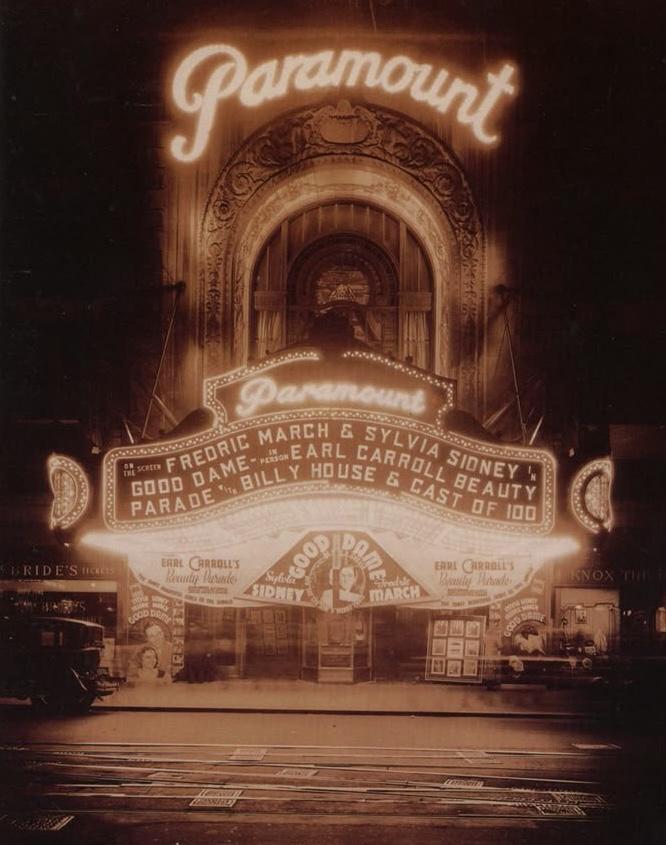
tinue losing to the new digital landscape — we’re practically begging for it.
Now, I’d be lying if I said I swear by VHS tapes and get my daily playlists from anything other than Spotify. But there is still something seriously missing from the cinematic experience today that previous generations got right, and we all know it.
the right direction, we have to start with our own habits. Don’t treat movies like YouTube Shorts. Invite people over rather than watching that film on your phone in bed. Or, for just once, trade out the phone for a Bluetooth projector outdoor movie night or a drive-in theater.
Reserve certain movies for specific times of the year.
For me, “Dead Poets Society” bleeds autumnal, but “Top Gun” shouts summer. Spend some extra money to see a film in concert with a live orchestra instead of watching it at home. Tell the big studios “no,” and cancel your streaming subscriptions. Or, simply bring your friends to our very own UEC Theatre here in Hillsdale or NCG Cinema in Coldwater, like the men and women of old. In other words, don’t doomscroll cinema — savor it. Experience it. Watch a movie without being on your phone and then finish it well by resisting the urge to immediately Google the actors or director when the credits roll. Sit with a movie after it’s ended. Feel and take hold of it, allowing the film to stew in your mind without making it just another piece of short-lived entertainment. After implementing small habits like these to guard cinema against becoming another form of endless consumption, you might find that movies should have always been set apart from other digital entertainment and wonder why we didn’t preserve them as such in the first place. We might even start to rediscover what was so special and memorable about movies before.
Although film releases have been bleak lately, the future of the moviegoing experience is still in our hands. It won’t start with just protesting out-oftouch studio priorities, but by our decisions to intentionally and habitually uphold an art form that we’ve nearly lost.
“A Sound in the Brush,”
“Closing In,” oil on canvas by Albin Veselka Grace Brennan | Collegian
A vintage theatre, a staple of Americana.
COURTESY | Pintrest
Crafting stories: Film and the human experience
By Monica Smies Collegian FreelanCer
When senior and psychology major Joshua Burnett came to Hillsdale, he knew he wanted to explore film production but wasn’t sure where to start.
“I wanted to make cool stuff,” Burnett said.
Burnett has now created and produced four films through Hillsdale’s Film and Production Club. He worked with Michael Lynn Animation Studios and Copernican Media and freelanced in Texas as the second director and producer coordinator on a feature film, “The Blood of Bulls,” shot with sophomore Caleb Diener and Hillsdale alumni Jane O’Connor ’21 and Chandler Ryd ’18.
“Film is a meeting place for so many different artistic media,” Burnett said. “You can bring in painters, musicians, actors, architects, and animators. In some ways, my favorite thing about film and the reason I want to work in it is because it’s a collaboration between so many different artists.”
Burnett had been interested in exploring film and film production in high school. After taking a documentary class his freshman year at Hillsdale in 2020, he joined the Film and Production Club as a video production assistant. The club allows students of different artistic backgrounds to act, direct, and produce their own short films.
At Hillsdale, Burnett has helped produce “Act-shun,” and “A Peculiar Set of Stairs.”
A project he produced that was released in the spring, “Shall We?” depicts a complicated romance between Catholic and Protestant Hillsdale students.
His first film that he directed with Hillsdale College, “Forced Perspective,” stars Fiona Mulley and Rachel Dunphey, with an original score by Ethan Graham. It follows the tension between two sisters’ ambitious pursuits which ultimately lead them apart. It is in post-production and will be released late October to early November.
Senior Charlie Cheng, president of the Film and Production Club, said Burnett is a central figure in the club.
“He always makes sure everything is taken care of,” Cheng said. “When working on a project with him, he’s always a good communicator and executor. He’s the type of person you definitely want on your team.”
When COVID hit, Burnett decided to take a gap year. During this time he worked with Iraqi refugees in San Diego, where he became interested in Middle Eastern cultures and learned to speak Arabic.
The multicultural experience informed his perspective and the way he wants to tell stories, he said.
“It’s a beautiful language and a great culture, great people, amazing food,” Burnett said. “It’s something that I think has also impacted my storytelling. I definitely have been wanting to work on a couple of Arabic language projects or multilingual projects.”
In order to incorporate psychological and multi-cultural dynamics in his art, he hopes to one day create a short animated film on the fall of Baghdad and destruction of the “Bayt al-Hikmah.” It is also known as the House of Wisdom, the prevalent library in Baghdad which was sacked and destroyed by the Mongolians in 1258.
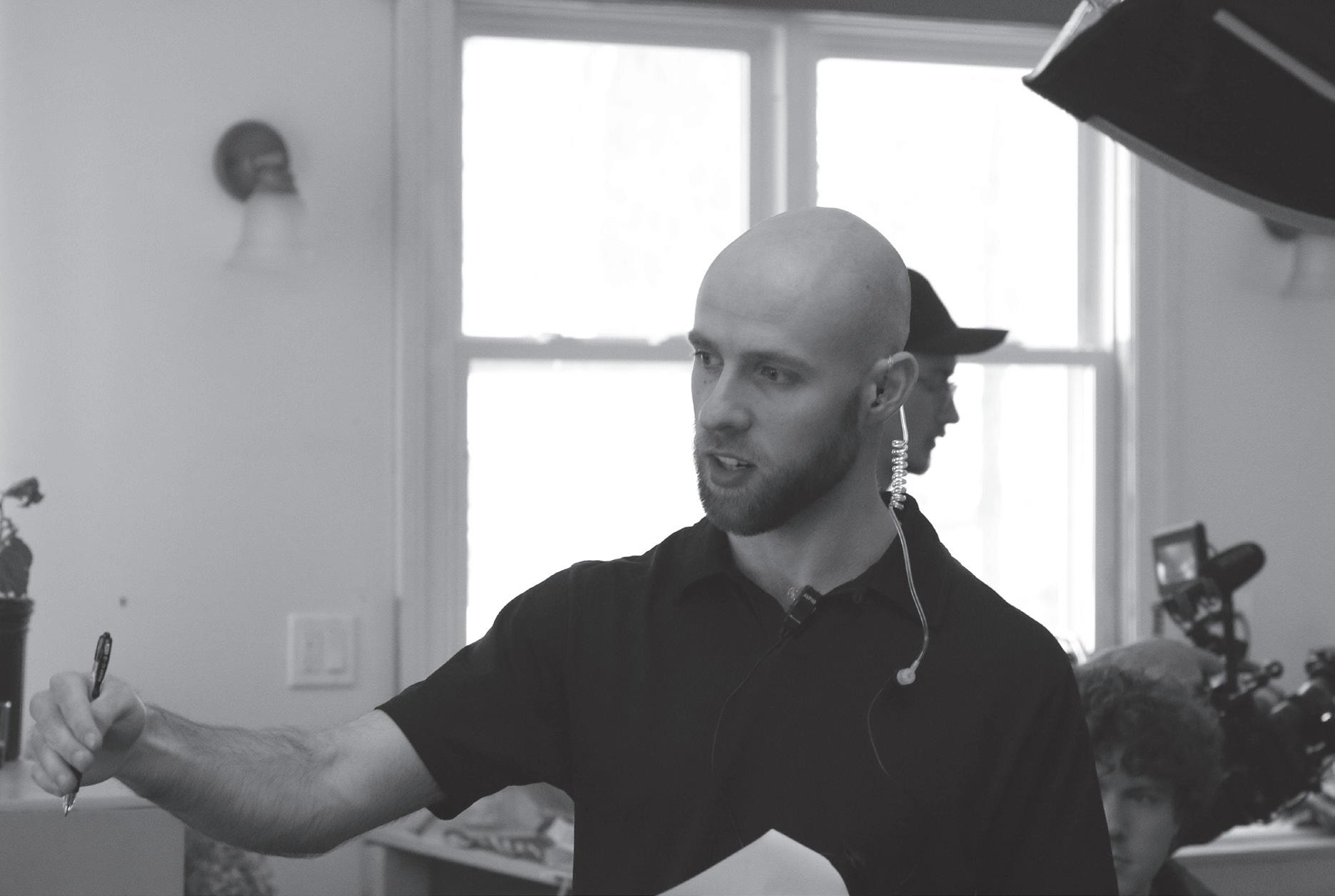
Burnett said his background in psychology has helped him in his screenplay writing, directing, and collaborating with other film artists. He said he considers film to be a great way to understand the human experience without actually fully experiencing it.
“Film is, at the heart of it, very human,” Burnett said.
Burnett said he believes the art of film is about, not only the audience and the audiences’ emotions and interpreta -
Netflix hits the mark with KPop Demon Hunters
By Ameera Wilson Senior reporter
Any film titled “KPop Demon Hunters” does not deserve to be good. The name alone is enough to make a viewer cringe at the new Netflix film.
However, not only does it drop some legit bars, this movie was fun, creative, and with better morals and messaging than most modern cartoons.
The plot of the movie can be summarized by its ridiculous name. A KPop girl band (HUNTR/X) fights demons by creating a barrier powered by their fans.
The story takes a turn when a demon boy band (Saja Boys) shows up, stealing the fans and attention from the girls band, therefore stealing the girls’ ability to keep the demons locked away.
Was it silly? Yes, very much so. But that silliness is actually one of the strengths of the movie. The premise is lighthearted and the movie isn’t trying to be anything else. It leans into its own goofiness with exaggerated animation and humorous dialogue. Although the main characters are pursuing an important goal, the movie does not treat them too seriously and did not expect the audience to either. The girls weren’t ice-cold girl bosses; they were dorks. The writers did an excellent job adding human beats, even things as simple as a demon slipping and falling over. The movie was meant to make people laugh and in that it succeeded. However, this does not mean that there was nothing serious in the movie. Even though HUNTR/X and the Saja Boys warring for fans was a ridiculous premise, the movie contained real faults,
real growth, and actual risks. Looking at newer Disney films, there is a lack of villains. “Turning Red,” “Luca,” “Encanto.” All those films, portrayed with minor conflict, fail to have an evil to defeat. The stakes have never been lower. Bad guys are ‘misunderstood.’ “KPop Demon Hunters” on the other hand, has actual villains that will murder you and suck out your soul. They were in no way misunderstood. In fact, even the most sympathetic among them turned out to have been truly despicable in his past.
band singer, is controlled by the devil because of his very real failings. The devil is the accuser, constantly bringing those memories up and reminding him that he does not deserve to be forgiven and cannot be.
In the final villain song, there’s a reflection of the progression of a demon’s temptation. It begins with saying that they will “be your sanctuary,” “the only ones who will love your sins,” and are “here to save you.” But by the end, the song states that “no one is coming to save you,” “watch me set your world on fire,” “you’re down on your knees, I’ma be your idol.” The devils in the movie first claim to love the sin and accept it, but by the end that sin is the very thing they hold against you to keep you from trying to change.

Not only that, but there was character development beyond the modern realization that the only problem possible in oneself is a lack of confidence. Rumi, the main character, had to realize that she could in fact not save herself. She discovered that hiding your flaws and faults does not make them disappear. Her lowest point in the movie caused her to confront the reality of her lies and face the consequences of her former actions.
In connection with that, I was actually impressed by the movie’s portrayal of demons. In fact, it was a depiction that reflects a Christian idea of the satanic.
The writers demonstrated that bondage is by shame and guilt for real sins and faults. Jinu, the male lead and boy
For both Jinu and Rumi, growth is not found in accepting your faults but in recognizing them.
To quote their song “Free”, “How can we fix it if we never face it.”
Another rare feature of the movie was girls who actually act like girls. HUNTR/X’s friendship dynamic was lively, funny, and genuinely feminine, none of which is common to see portrayed in media today.
The movie was proof that even in a fun kids’ film, there can be truth and both thoughtfulness and effort. It’s worth getting over the cringe and enjoying the watch. And as a final note, the music has been stuck in my head for weeks. The soundtrack will simply not go away. So even without the good messaging, the fun characters, and the humor, “KPop Demon Hunters” sticks in the mind.
To quote the film: “It’s infectious.”
tion, but the development and understanding of the characters’ souls, the artists who make the film possible, the time and dedication required to produce, and the joy of the final gift that keeps on giving which is the film itself.
Senior Joseph Johnson, vice president of Hillsdale’s Film and Production Club and director of “A Peculiar Set of Stairs,” worked with Burnett as his producer.
“Josh has been largely one of the key revitalizers of the film club these past couple of years,” Joseph said. “He was
able to really take over the vital role of producing the club’s films. His ability to handle any task, big or small, has given most of our films the life they needed. He truly knows what it takes to get a film off the ground, even a small project, and he does it with incredible dedication.”
Burnett said he wants to pursue a career in narrative film and sees himself producing more film features, TV shows, and animation. Some of Burnett’s favorite films are “Princess Mononoke,” “Memento,” “Grizzly Man,” “Perse-
polis,” “Waltz with Bashir,” “Inception,” and “La, La, Land.” He recommends these films because they expand our understanding of film. Burnett said he always wanted to convey a good story, and producing films with Hillsdale college gave him that opportunity.
“There’s one shared artistic vision, there’s one story you’re telling, but you need so many different artists who are incredibly talented in their medium and in their craft to be able to tell that story at the highest level,” Burnett said.
Professor’s Picks
Catherine Kuiper, Assistant Professor of Education



“Enter the Dragon” (1973)
For the moment, at least, this is my favorite song. It’s simple, poetic, and true.
It’s worth exploring because no other philosophical text in the western tradition did more to prepare the world for Christianity; and arguably, no other pagan text did more to help early Christians develop their own theology.
it’s a kung fu movie from the ’70s, but it’s also Bruce Lee commenting on Augustine, if you think about it hard enough.
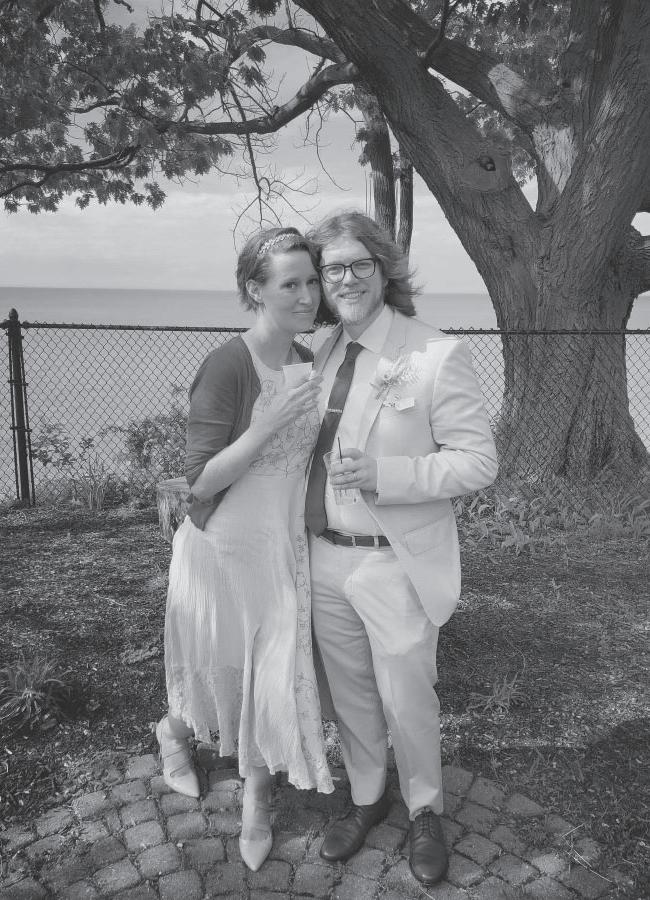
“Phaedrus” by Plato
“Annie’s Song” by John Denver
Yes,
Dr. Kuiper with her husband, Andrew. COURTESY | Catherine Kuiper
Burnett directs actors on the set of “Forced Perspective.”
COURTESY | Joshua Burnett
The “KPop Demon Hunters” movie poster COURTESY | Netflix


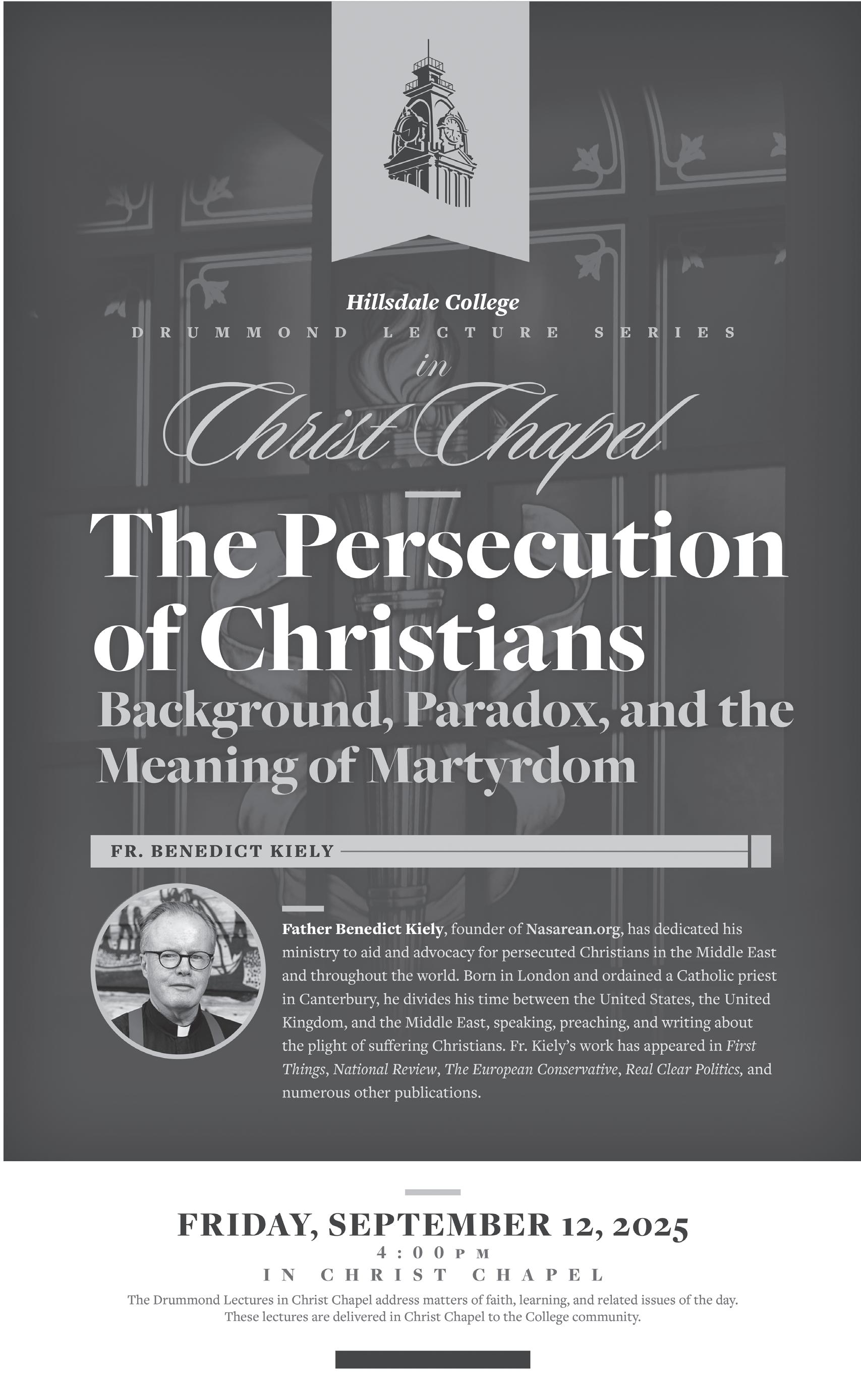
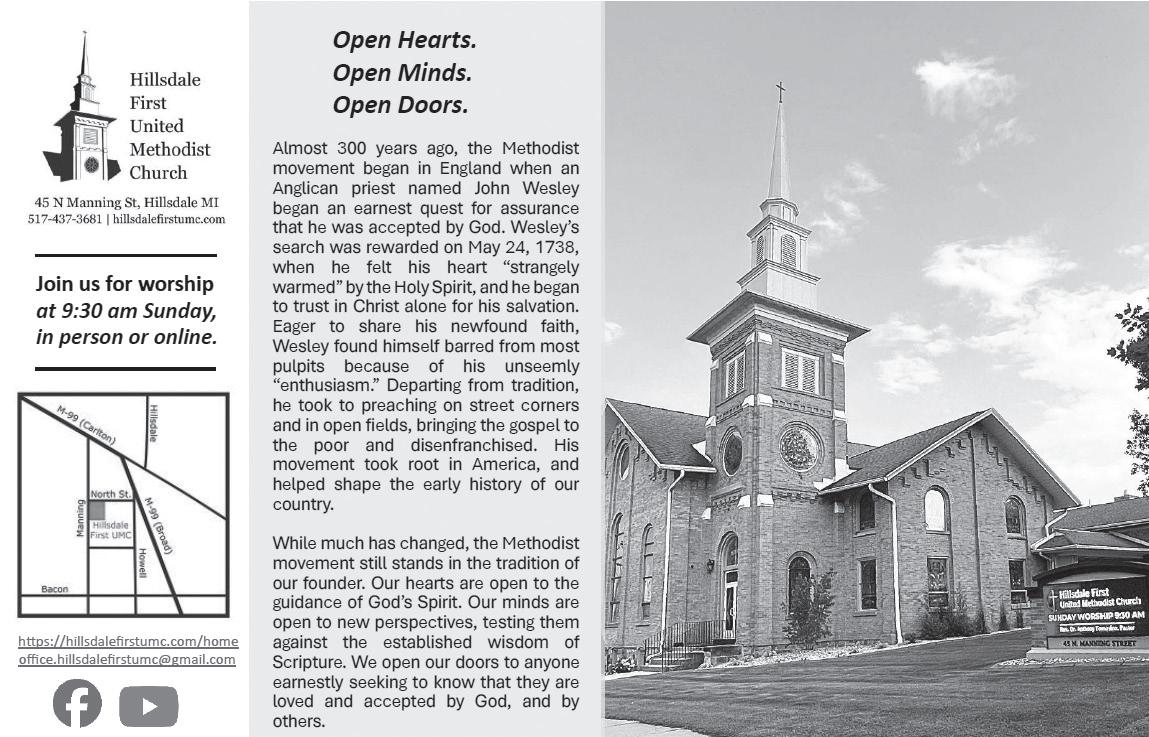

Beyond Saga: Students whip up homemade meals
Communal kitchens have become a center for sharing culinary heritage around campus
By Jayden Jelso Collegian Reporter
Pans sizzle and stovetops glow for students who cook fresh meals in their dorm kitchens, anxious to put their culinary skills to the test. For many of these students, their passion for cooking stems from tradition, practicality, and the desire to bond with friends.
Senior Stephen Zhu did not discover his hobby for cooking until winter break of his freshman year, after realizing it was a great way to foster community in his dorm.
“A lot of my friends have never had Chinese food,” Zhu said. “I wanted to give them that experience, but I didn’t know much about cooking, and so I started getting more into it. I practiced a lot over winter break, and now I really enjoy doing it.”
Zhu said despite what some
students may think, cooking in the dorm is not cheaper than eating in the dining hall for each meal. According to him, students only save around $200 when they switch from 19 to 15 meals a week.
“When you take into consideration the time that you’re losing from spending time cooking instead of just going to the dining hall, then you wouldn’t end up saving money,” he said. At home, Zhu cooked what he called the best dish he has ever made. It was a stir-fry with Chinese yellow chives, a very expensive vegetable that has a lot of flavor.
“My mom got me some because she knew that I wanted to try it, to see what it was like. It costs more per pound than steak, so it’s definitely a luxury ingredient,” Zhu said.
Zhu likes to bring people together with his cooking, something that freshman
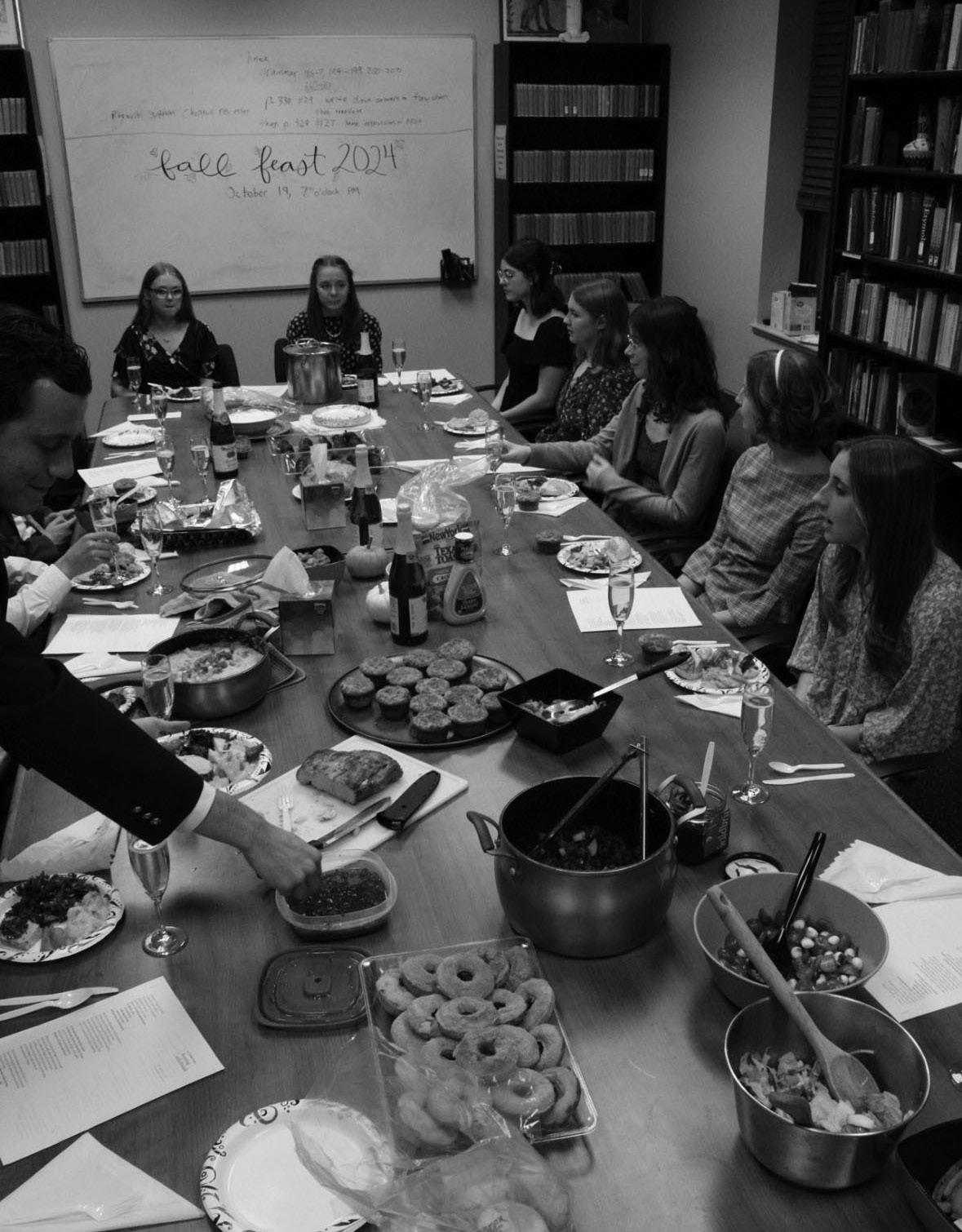
Vito Gabriele has done in his family’s restaurants for years. When Gabriele’s grandparents came to the United States from Italy, they opened a pizza restaurant, the beginning of a long line of family-owned eateries.
“My father grew into the business and started working in the restaurants,” Gabriele said. “As he got older, he built restaurants and expanded, and so did my grandfather.”
pasta. When he came to Hillsdale, he knew he wanted to keep his passion for cooking alive.
“I don’t use all my meal swipes because I have the same passion here. It’s a different experience when you have one-on-one time with yourself, and maybe you’re cooking for somebody else. It’s important to cook, especially for yourself, because when you’re out of college, you’re
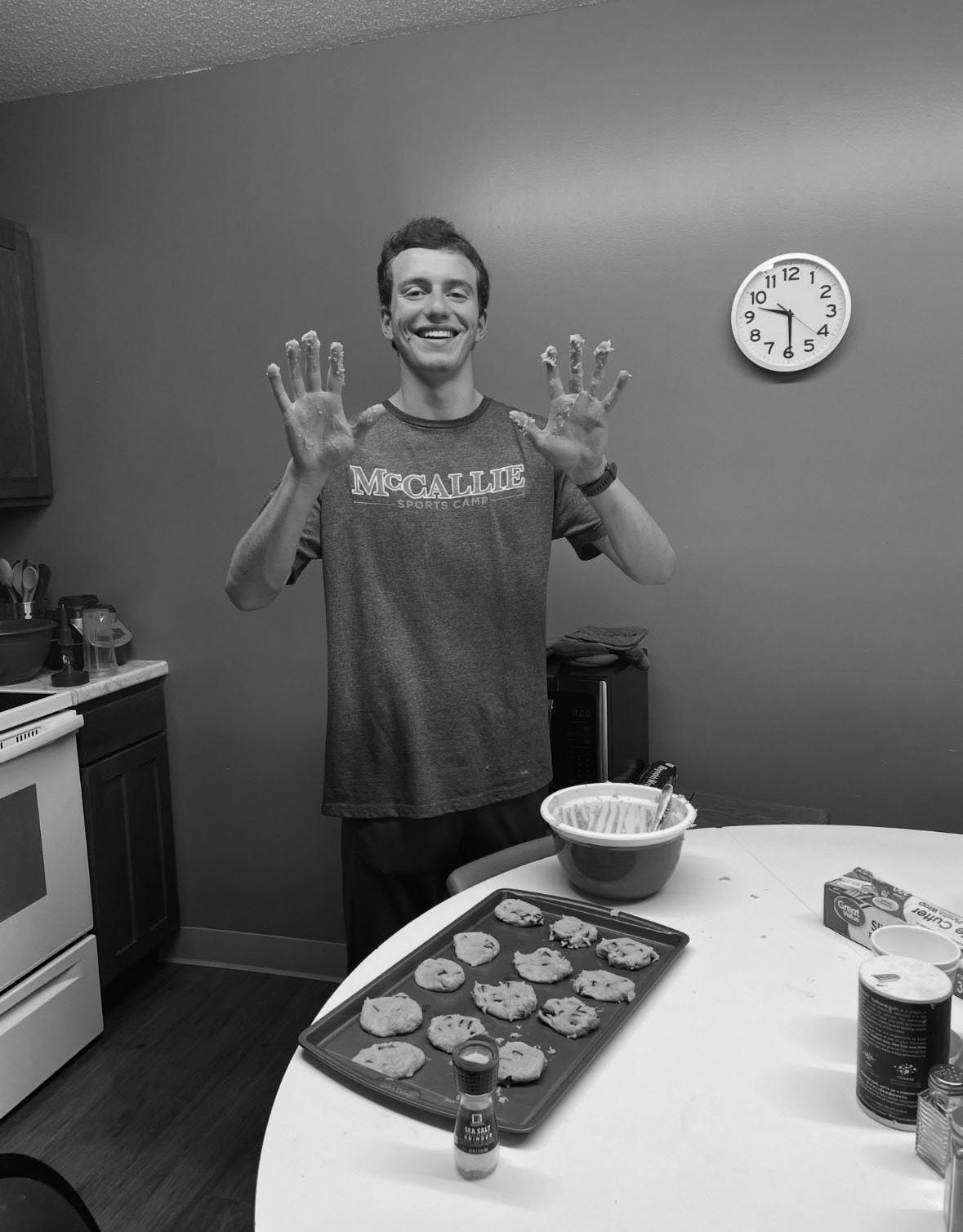
Food is a great passion in Gabriele’s family, especially because of their Italian heritage. When Gabriele was old enough, he too began working in his family’s restaurants.
“I first started as a bus boy. I went around the tables and I talked to people,” Gabriele said. “I did magic tricks, but then I worked my way up.”
Gabriele started making pizzas before moving on to more advanced dishes like
not going to have a meal plan,” Gabriele said.
Despite his family’s long history of success, Gabriele made it clear that cooking does not come without its failures.
“One time, I was cooking a pizza and I just forgot about it,” he said. “I was 30 minutes in when I pulled it out of the oven, and it was black. I was watching ‘The Sopranos.’ I was so intrigued with what was go-
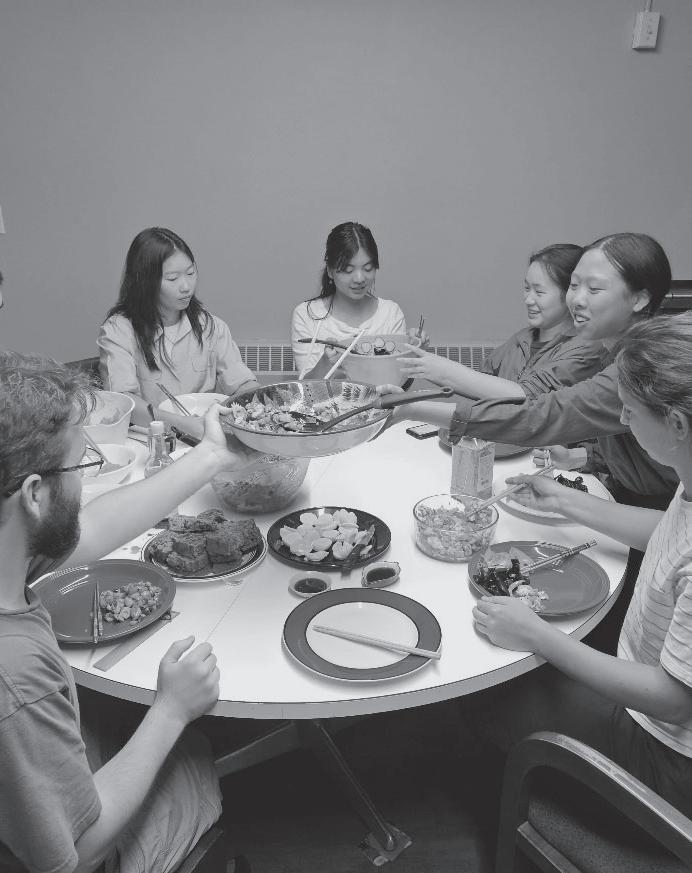
ing on that I just forgot about the pizza.”
Gabriele has experience cooking for large groups of people, which junior Rhys Woodard does regularly with elaborate potlucks.
“My friend group and I will do a dinner together once a month or so,” Woodard said.
“For Fall Break, we always do a big one with friends who are here on campus. We invite a bunch of people, and we usually cook both cookies and meat for that. And then, for Easter dinner, we do a big feast as well.”
Woodard said he learned to cook from a world geography class he took in ninth grade.
The course required him to cook nine meals from different regions, and he took a liking to it.
“There’s an Indian lamb curry recipe that I did back for my geography class. You just chop up a bunch of lamb,
throw it in with tomatoes and spices, and let it simmer for two hours. And that’s absolutely incredible,” Woodard said.
In addition to cooking, Woodard’s signature chocolate chip cookies are a hit with anyone who tries them.
“The cookies are a recipe that I got from my high school mentor,” Woodard said. “He would make them every night he was on duty in the dorms. I went to a boarding school, and he doesn’t give you the recipe until you graduate, and he was walking around graduation with a stack of recipe cards.”
Most importantly, Woodard sees these friendly gatherings as opportunities for outreach.
“It’s like a form of ministry,” he said. “It’s a way to reach out to people.”
New alumni couple continues Catholic ministry at the Grotto
By Anna Stirton Collegian Freelancer
This year, Catholic Society welcomes a new alumni couple, Stephen and Jenny Conner ’24, to the Grotto.
The Grotto, an outreach of St. Anthony of Padua Catholic Parish, is an off-campus house dedicated to facilitating student faith, life, and community. This house has also traditionally been the home of a couple chosen by the parish to live and work in service of the Catholic student body of Hillsdale.
“We are hoping to help demonstrate how the laity can have a certain rule of life and really center their whole home and whole day around prayer and around our Lord,” Jenny Conner said.
In addition to hosting talks, events, and activities, the Grotto contains a chapel with the Holy Eucharist always present just a couple blocks away from campus.
“Just by the presence there, it becomes a place of rest for students that is unlike any other place on campus,” Catholic Society Vice President junior Lizzie Putlock said.
Stephen and Jenny Conner said the Grotto was not only a vital element of their individual college experiences, but actually brought them together.
“The one thing Jenny knew about me when we had met for the first time at Saga was that I was Protestant and my name was Stephen with a PH,” Ste-
phen Conner said. Jenny Conner said she was quite surprised when she ran into Stephen at the Grotto the next day.
“I was shocked,” Jenny Conner said. “I think I just said, ‘What are you doing here?’”
That unexpected encounter was just the start of a college career for both students rooted in the formation and community the Grotto had to offer. Despite telling Jenny Conner that he was Protestant as soon as he met her, Stephen Conner said he kept coming back and was eventually confirmed Catholic in the spring of 2021.
“The Grotto just became a very important place for us
throughout college, and as we were discerning marriage and what we wanted to do after school,” Jenny Conner said.
After graduating, the Conners moved to Arizona, where Stephen Conner started teaching at his old school, Cicero Prep Academy. The couple quickly settled into their new life together.
“Things were going well, and we were not planning on making any kind of change,” Stephen Conner said.
However, when the Grotto called, the Conners answered. Upon hearing from Jenny one
evening that the Grotto position was open, Stephen said that his immediate reaction was, “I think that we are probably going to have a life change here.”
Jenny Conner noted she and her husband have always believed evangelical mission to be an important aspect of their marriage. She explained that they were married on the Feast of the Visitation, which she described as “a day of apostolic mission.”
“The idea that we as a married couple could have the opportunity to go on a mission
together to help support the Catholic community at Hillsdale was very exciting, and we saw it as in line with our vocation of marriage,” Jenny Conner said.
After careful discernment and a series of interviews and conversations, the couple officially turned over the page to a new chapter. They said they packed up all their belongings and moved to Hillsdale in July.
Having experienced many opportunities for faith life and community at the Grotto as students, the Conners say they hope to continue this tradition for Hillsdale’s Catholic student body.
It doesn’t need another campus center or another student center, it needs a home,” Stephen Conner said. “It needs a place where students can encounter our Lord in a kind of intimate and sacramental setting.” Putlock said when the Catholic Society Board convened at the Grotto before classes to meet the new couple, Stephen Conner started the meeting by leading them into the chapel and opening in prayer.
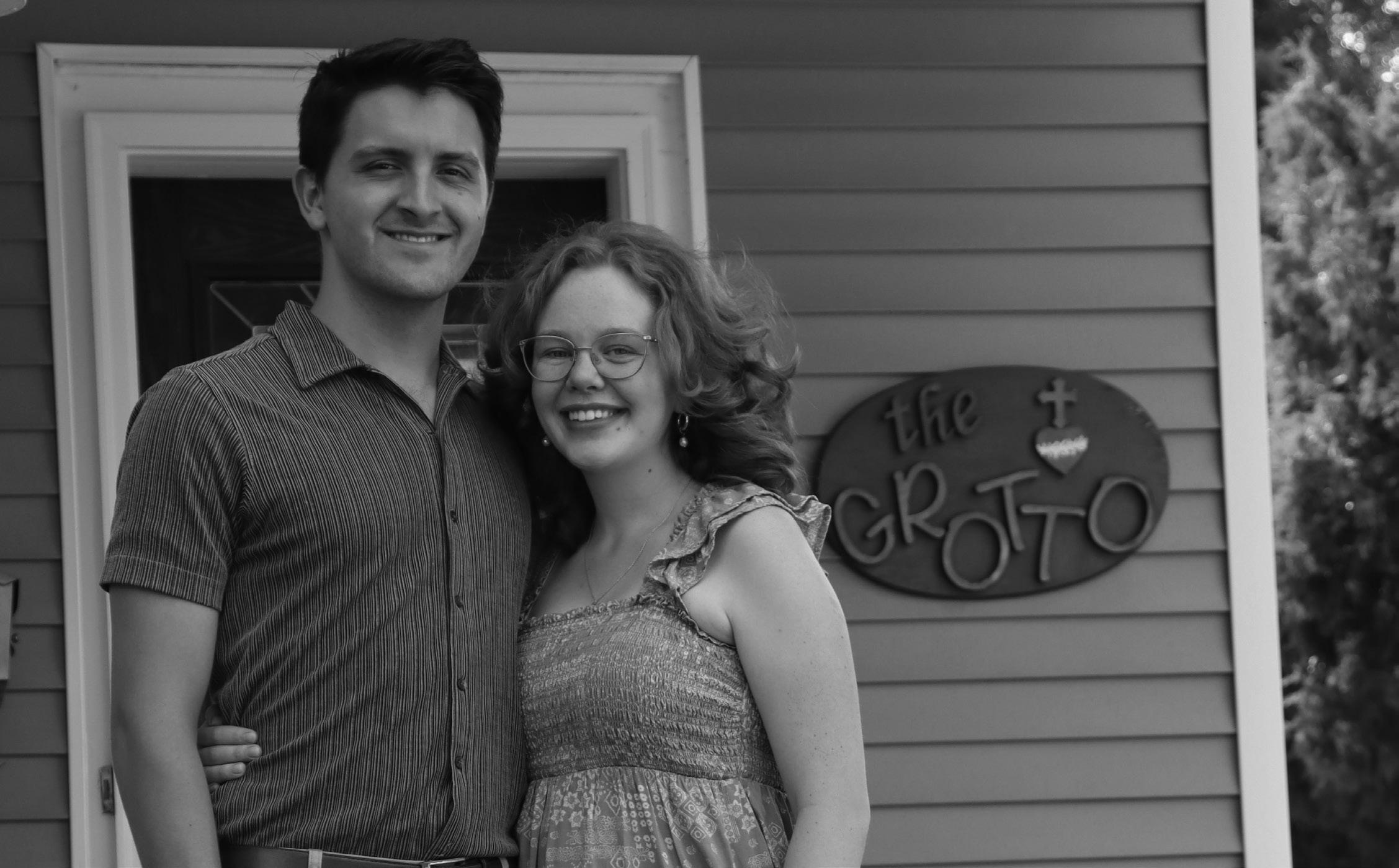
“Hillsdale is already such a small-ty.
“I just had this sense that their first focus was on Christ himself, Christ in the Eucharist, Christ as a person,” Putlock said. “I just think being able to see Stephen’s heart in that way and Jenny’s heart in that way really inspired me to be like these people — they’re really on a mission.”
While preserving the established tradition that has guided the Grotto thus far, the Conners say they also have fresh ideas and areas of focus that they hope to bring to this endeavor. One of these new practices is the recitation of morning and evening prayer at the opening of the Grotto and just before its closing at night. Stephen Conner said he plans to lead daily prayers such as the Chanticle of Zachariah in the mornings at 8 a.m. and the
of Simeon at 11 p.m. “It’s a house, a home, but it also has a kind of monastic
as
Song
spirit to it
well,” Stephen Conner said.
Junior Rhys Woodard whips up a batch of his signature chocolate cookies in Niedfeldt dorm.
Courtesy | Rhys Woodard
Students gather for a dinner party over Fall Break. Courtesy | Rhys Woodard
Students pass homemade food around a kitchen table. Courtesy | Stephen Zhu
Stephen and Jenny Conner smile in front of the Grotto house. Courtesy | Jenny Conner
FEATURES
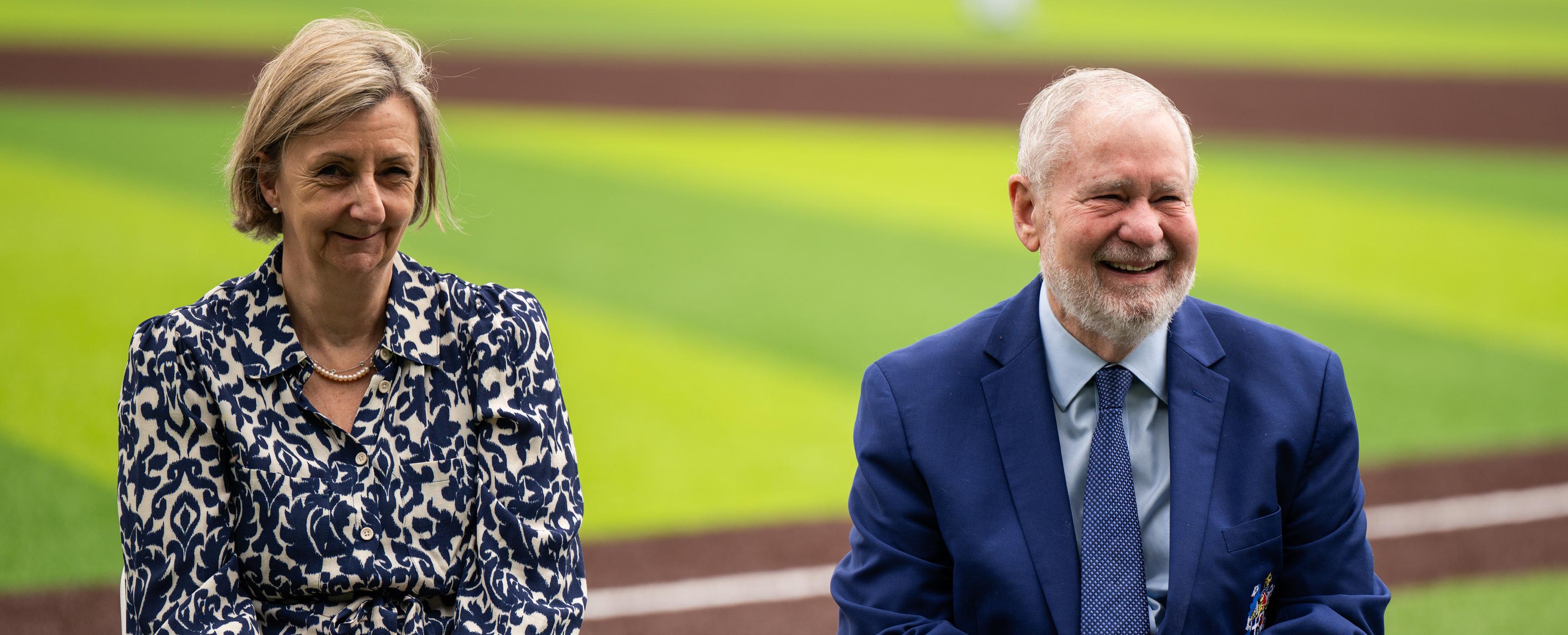
Arnn from A1
Rich Péwé, chief administrative officer, has been a member of the administration since 1999 and has overseen many of the projects that have taken shape since Arnn became president in 2000, including the construction on campus today. The college has improved in every measurable way since 2000, Péwé said.
“Dr. Arnn’s motto is, ‘Do the same thing over again only better,’” Péwé said. “Because he holds to that, Hillsdale is now a
serious and difficult to get into, Christian, liberal arts college, dedicated to the preservation of truth and to being the best college in the country for teaching the kinds of things that makes a free society possible.”
Arnn himself teaches what he calls “the fundamentals.”
“They are the best things to know,” he said. “I have learned something about them and maybe helped others to learn.”
Though, of course, he said if he could teach one thing, it would be Aristotle.
He also said he has noticed changes in his students — their
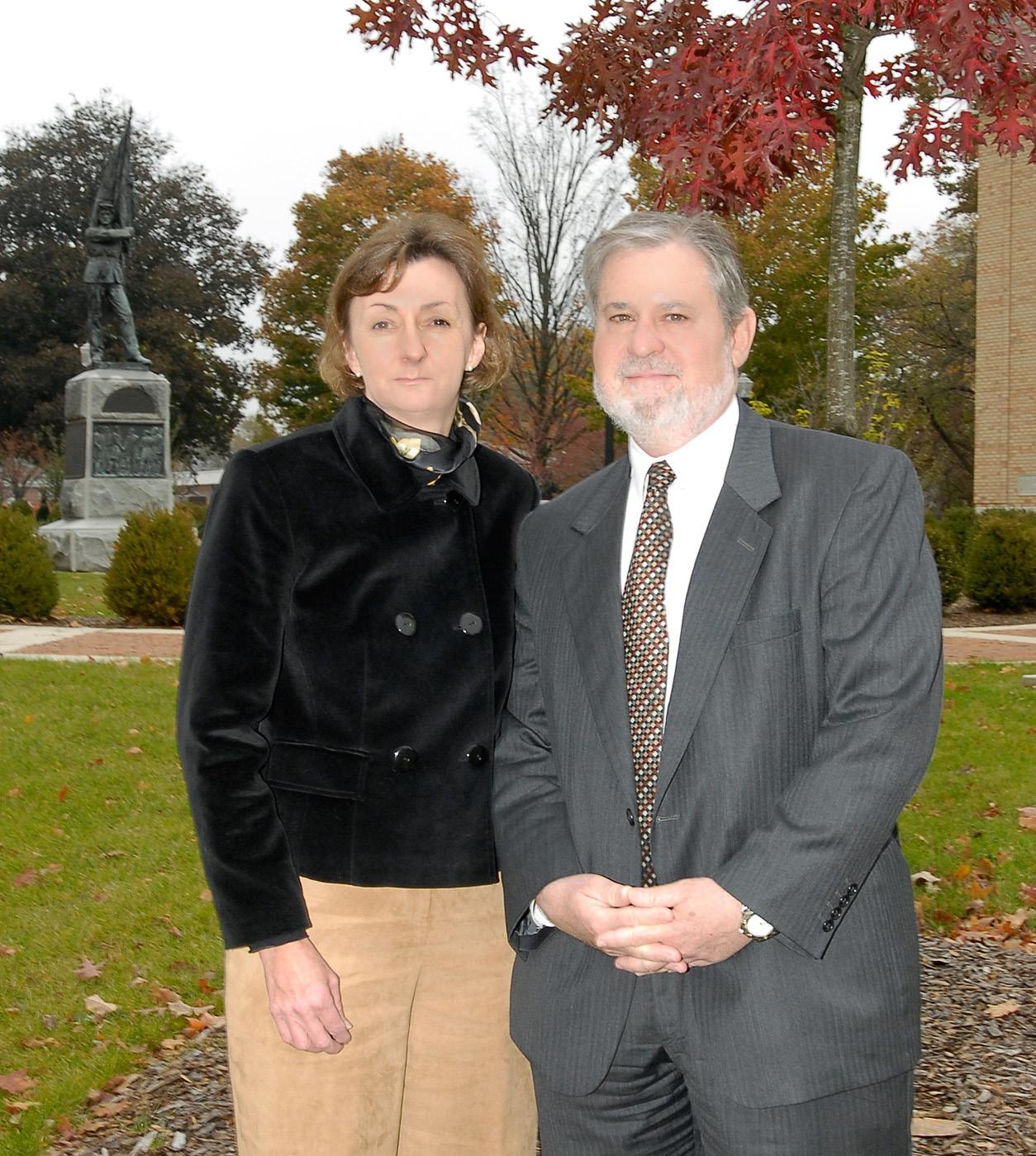
demeanor, habits, and stature.
“Success rates of the students both coming in and going
I think the students are taller and even better looking, meaning no slight to alumni.”
“I think the students are taller and even better-looking, meaning no slight to alumni.”
out are higher. They are smarter and more dutiful. They are fun, and they work, and one learns from them,” Arnn said. “Aristotle writes that nature tries to put good souls in good bodies, and
Senior Mary Ellen Petersen grew up in Hillsdale, attended events at Broadlawn from the time she was a toddler, and studied Churchill under Arnn last spring.
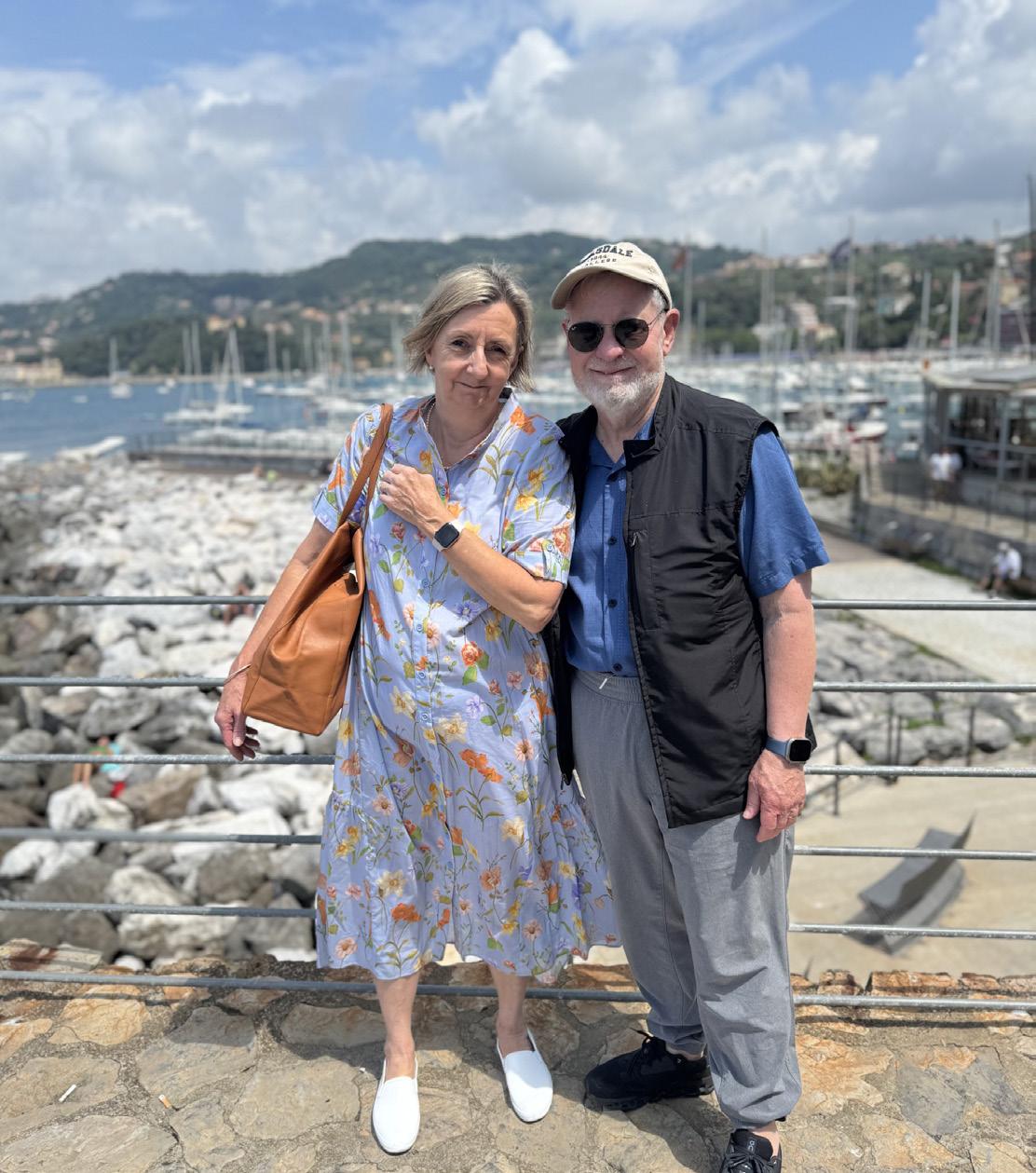
“I had an amazing time in class with Dr. Arnn last semester,” Petersen said. “Growing up I went to Broadlawn every New Year’s and it was really cool to see both sides of Dr. Arnn last year.”
Arnn has watched the years pass on the faces of his students. That shows the product of the college and, hopefully, its future.
“We are getting the children of people I had in class back in the day,” Arnn said. “That makes one proud, and also makes one think about time.”
The college has undergone a metamorphosis during Arnn’s tenure, and those close to the college said they hope Hillsdale’s mission continues. Luckily, Arnn said his career is not on any specific timeline.
“My arrangement with my bosses is that I will do the job as long as I am the best one to do it. I have some things to accomplish that will take a few years if the Lord gives me the time,” Arnn said. “They are all extensions of what my wife and I set out to do 25 years ago.”
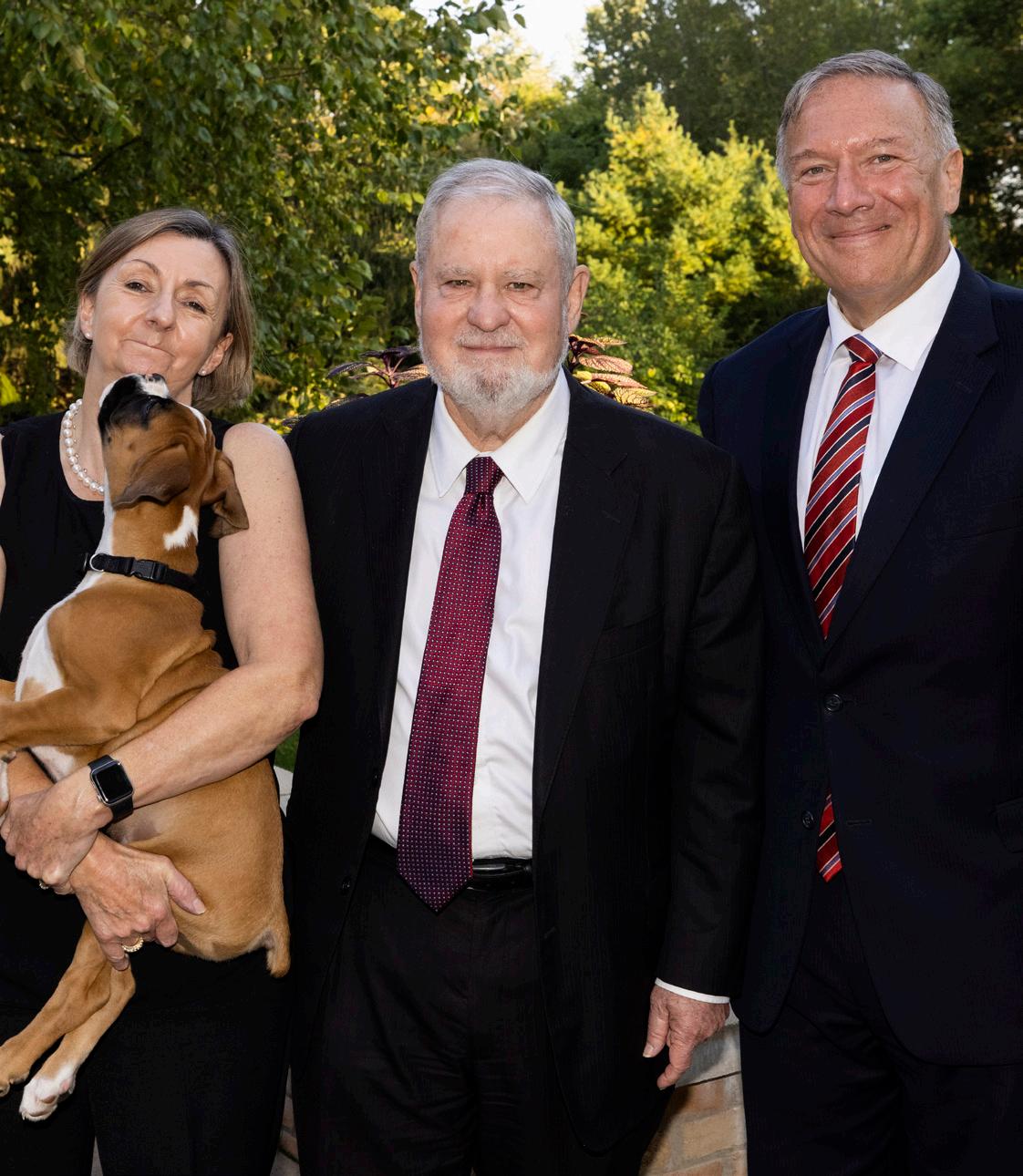
Quick Hits with Korey Maas
By Caroline Kurt Opinions Editor
In this Quick Hits, Chairman and Associate Professor of History Korey Maas discusses Yabby You, Hello Kitty tattoos, and James Bond.
If you were banished from the history department, what would your second career be?
The correct answer, since I attended seminary and am ordained in the Lutheran Church — Missouri Synod — is that I’d be a parish pastor. But they still haven’t chosen the next James Bond, so I’m keeping my options open.
What’s the funniest thing a student has ever said to you?
“To be deep in history is to cease to be Protestant.”
(C’mon, that was a slow pitch straight over the plate!)
Where did you grow up?
We moved a fair bit through junior high and high school, but I still think (fondly) of Waterloo, Iowa, as my hometown.
What is your current favorite pastime?
Reading — as boringly predictable as that answer is — will probably always top the list, but the manual labor of maintaining and improving our rural home and land is a very close second. I can’t highly enough recommend getting out of one’s own head regularly.
What’s one thing Hillsdale students should know?
Christ and him crucified (1 Cor. 2:2).
What is your favorite class to teach?
Western Heritage is still a real joy, not least because first-semester freshmen are wonderfully eager and active.
What’s your go-to road trip music?
Tom Waits, Nick Cave and the Bad Seeds, The Specials, Yabby You, The Decembrists, and recently, Buffalo Wabs & the Price Hill Hustle.
Do you have any tattoos?
Hello Kitty covers my entire back. No, actually, given the many and various other ways I managed to disappoint my parents, I steered clear of tattoo parlors.

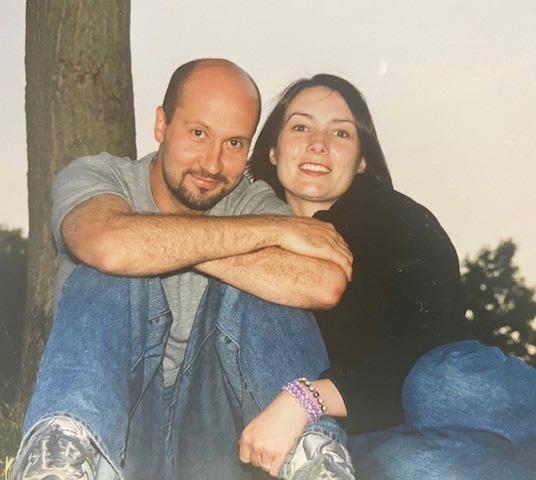
Korey Maas and his wife Kate in Hyde Park, London during graduate school.
Courtesy | Korey Maas
The Arnns host former U.S. Secretary of State Mike Pompeo at Broadlawn in 2021.
Courtesy | Scott Galvin
The Arnns on campus in 2006. Courtesy | Douglas Coon
The Arnns on vacation. Courtesy | Larry Arnn
Larry and Penny Arnn are all smiles at the Lenda and Glenda Hill Baseball Stadium for its dedication in 2024.
Courtesy | Austin Thomason
